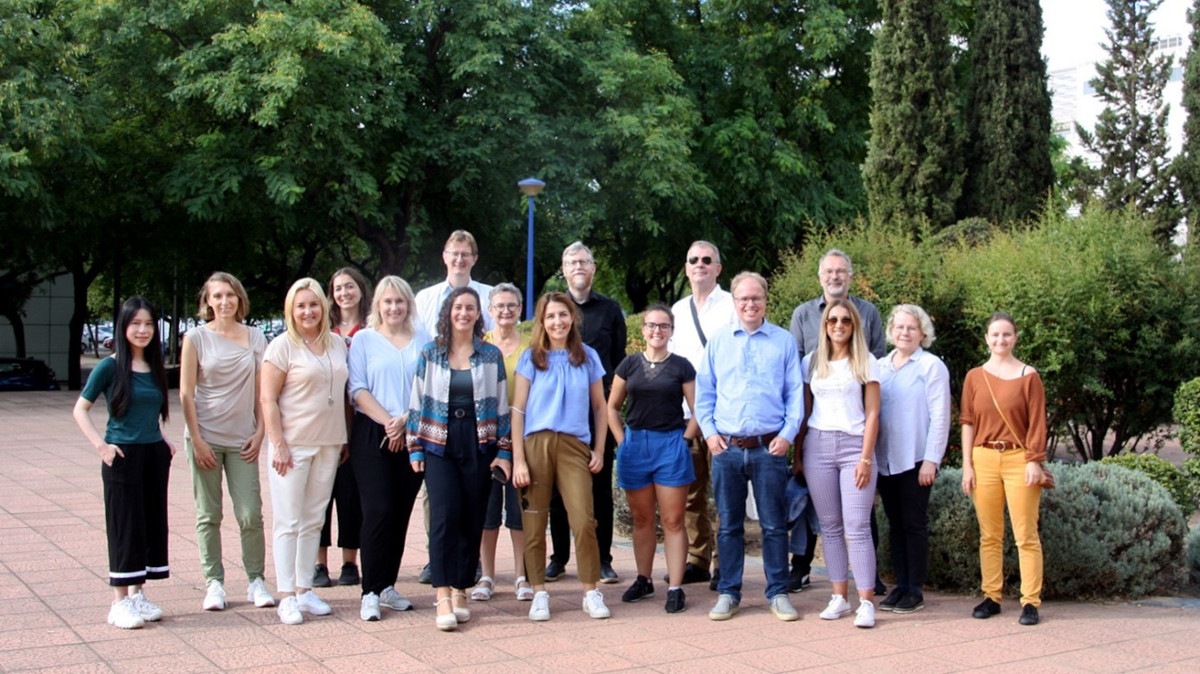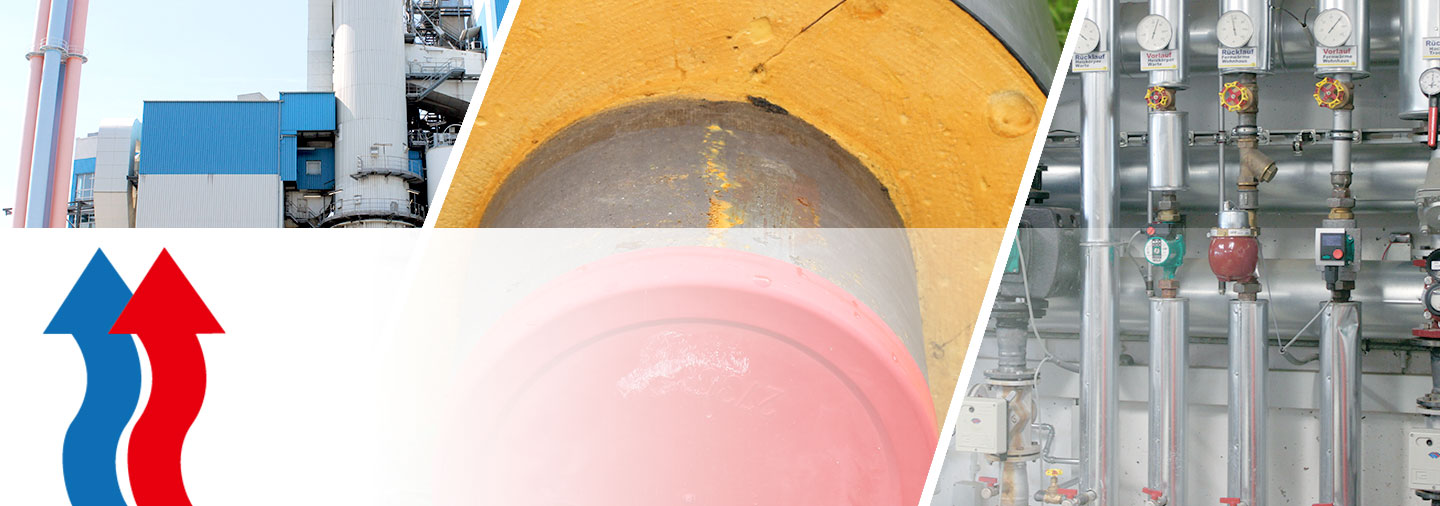

News & Events
SCALE-UP Andalusian Bioeconomy Platform: three years of alliances and innovation
Our Final Newsletter Unlocks Three Years of Bioeconomy Innovation
Turning Waste into a Resource: SCALE-UP Featured on Macedonian National Air Quality Platform
Regional Platform for Bioeconomy – The road ahead after SCALE-UP
Regional bioeconomy in practice: The Upper Austrian bioeconomy platform as a model for systemic transformation
Sustainability plan for the SCALE-UP multi-actor platform in the French Atlantic Arc
Final Regional Platform Meeting in Mazovia: Continuing the Path Toward a Sustainable Bioeconomy
From Roots to Results: SCALE-UP’s Impact in Strumica
Stakeholders in the French Atlantic Arc mobilised to make the most of plant by-products and fibre plants
SCALE-UP Showcases Three Years of Rural Bioeconomy Impact at European Rural Circular Bioeconomy Conference
Mark Your Calendars: European Rural Circular Bioeconomy Conference Comes to Brussels (May 13-14, 2025)
Spring 2025 Edition Newsletter of the SCALE-UP Project is Available!
SCALE-UP Project Wraps Up a Successful Show at Bio360 in Nantes, France
BIO360 2025: SCALE-UP to Showcase Breakthrough Bioeconomy Innovations, Driving Europe’s Green Transition
Fifth Meeting of the Regional Stakeholder Platform Held in Strumica
Celebrating Innovation in Sustainability: Highlights from the student competition “Bioeconomy Through Art”
SCALE-UP Project Partner CTA Engages Over 80 Students in Innovative Olive Bioeconomy Competition
Exciting Student Competitions in the SCALE-UP Project!
Bioeconomy Days in Sweden: A Deep Dive into Forest Sustainability and Innovation
Passion for Sustainability Ignites at Strumica Event
SCALE-UP's spanish project partner CTA organizes an international meeting in Linares on opportunities of the olive bioeconomy
SCALE-UP held Regional platform meeting in Normandy for a demonstration of chopped straw
SCALE-UP Project Successfully Concludes International Study Tour on Bioeconomy Along the Danube
Exploring Europe’s bioeconomy potential: SCALE-UP project releases comprehensive factsheets
SCALE-UP Project Holds Third Strumica Regional Platform Meeting Virtually, Focusing on Sustainability
SCALE-UP Project Study Tour Explores Bioeconomy Potential in Strumica, North Macedonia, and Unveils Collaborative Initiatives with Open City Laboratory
Discovering Macedonia's Green Energy Marvel: SCALE-UP Study Tour Unveils Biogas Plant Innovation
SCALE-UP Project Study Tour Unveils Potential in Strumica, North Macedonia
How the Regional Bioeconomy Succeeds - Free Online Training for a Sustainable Economy
SCALE-UP Project Presented at Clustering Event Promoting European Bioeconomy Collaboration
SCALE-UP Initiative Selects 12 Promising Bio-based Solutions for Innovation Support Programme
SCALE-UP Extends Deadline for Call for Expressions of Interest to Boost Regional Bio-Based Solutions Innovation
SCALE-UP Project Showcased at Expobiomasa Professional Fair
SCALE-UP Launches Call for Expressions of Interest to Boost Regional Bio-Based Solutions Innovation
Second Regional Platform Meeting for Bioeconomy Held in Strumica, North Macedonia
SCALE-UP Project Launches Regional Platforms for Bio-based Innovation
CTA leads the Andalusian Bioeconomy Platform of the European project SCALE-UP
Northern Sweden as a model and inspiration
First regional platform meeting in Strumica, North Macedonia
TMG Organized the Austrian Regional Platform Kickoff Meeting
SCALE-UP Community of Practice Meeting
SCALE-UP Cross-regional Assessment Workshop: presentations and report available
SCALE-UP Kick-off-Meeting
SCALE-UP Andalusian Bioeconomy Platform: three years of alliances and innovation
Launched in March 2023 as part of the European SCALE-UP project and coordinated by the Technological Corporation of Andalusia (CTA), the SCALE-UP Andalusian Bioeconomy Platform brings together nearly 60 entities, including all Andalusian public universities, research centers, private companies, and investment funds. This strategic alliance drives innovation in the circular bioeconomy across Andalusia (Spain), with a strong focus on valorizing agricultural residues from the olive sector, a cornerstone of the region’s sustainable development and economic growth.
High engagement in SCALE-UP activities
The platform’s success is rooted in the active participation of its members in key activities such as:
- The clustering event in Málaga (July 2023), which gathered 18 European bioeconomy projects to explore synergies.
- The international meeting in Linares (June 2024), focused on olive-based bioeconomy innovations.
- The Express Ideas Competition in Churriana de la Vega (November 2024), engaging students in sustainable uses of olive biomass.
- The SCALE-UP international entrepreneurship event at the BIO360 fair in Nantes (February 2025).
- High participation by members of the Andalusian platform in the 21 seminars of the SCALE-UP training programme.
These initiatives highlight the platform’s strong presence across multiple locations and demonstrating a clear commitment to advancing the circular economy in Andalusia.
Alignment with regional policies and EU Projects
The platform has closely collaborated with the Regional Ministry of Agriculture, Fisheries, Water and Rural Development, a member of the platform, enabling SCALE-UP’s activities to be recognized in official documents like the Circular Bioeconomy Action Plan for the Agri-Food Value Chain 2025–2030.
The Andalusian Circular Bioeconomy Strategy has also been present in meetings with platform members, aligning with SCALE-UP’s goals and challenges. Additionally, the platform aligns with Andalusia’s Smart Specialisation Strategy (S3) and collaborates with other European bioeconomy projects, such as ROBIN and BBioNets, to foster knowledge exchange and joint innovation.
Scaling Innovation: Bioliza and Andaltec
The strategic vision of platform members has been key to its success. Notably, Bioliza and Andaltec were selected as beneficiaries of SCALE-UP’s Innovation Support Programme (ISP), showcasing Andalusia’s ability to scale up advanced bioeconomic technologies, including Bioliza’s pyrolysis systems for agricultural waste and Andaltec’s biorefineries producing composite materials from olive biomass.
Thanks to its participation in the Bio360 fair in Nantes, the French company S3D (part of the KERAN group) has expressed interest in joining Bioliza’s shareholding structure. This represents a significant reinforcement for the company, made possible by the international visibility and opportunities generated through the SCALE-UP project.
Active participation in the SCALE-UP Metacluster
Nowadays, the SCALE-UP Andalusian Bioeconomy Platform is actively involved in the SCALE-UP Metacluster, which connects regional platforms across Europe. Looking ahead, its members will co-host and participate in conferences, study visits, and webinars, fostering peer learning and international collaboration.
Andalusian experts will contribute to thematic working groups on topics like circular packaging, nutrient recycling, sustainable agri-food value chains, and rural bio-entrepreneurship. The platform will also share regional case studies, policy briefs, and technical reports via the Metacluster’s digital platform to inform and inspire other regions across Europe.
Final event
The final event of the SCALE-UP Andalusian Bioeconomy Platform has taken place online on August 28th, marking the conclusion of the project’s initiatives in the region. The event has included a review of the work carried out over the three years of the project, as well as a discussion on how participation in the platform has benefited the involved entities. In addition, the Andalusian Cluster of Circular Bioeconomy in the Agri-food Value Chain, of which CTA is a member, has been presented.
While the SCALE-UP project concludes, the Andalusian Bioeconomy Platform has proven to be a driving force for circular bioeconomy development across the region and beyond. CTA’s aim is to ensure that the platform continues its activity even beyond the SCALE-UP project. Let’s celebrate this together!
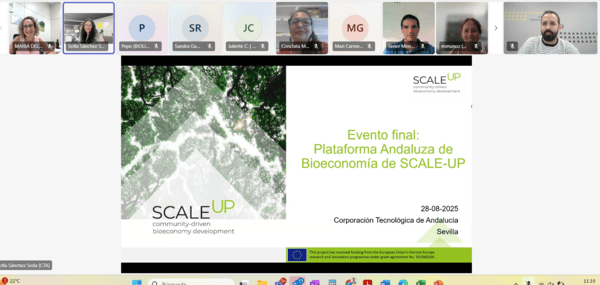
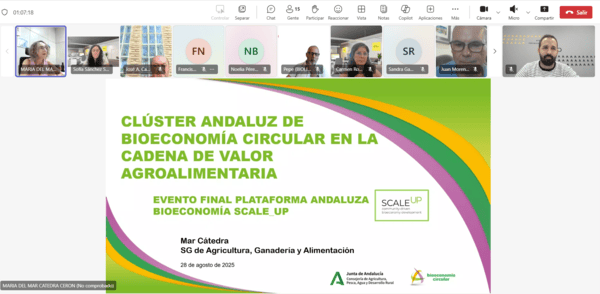
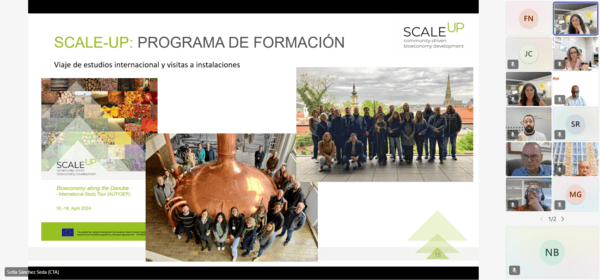
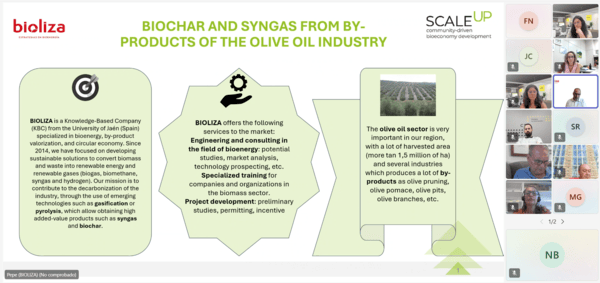
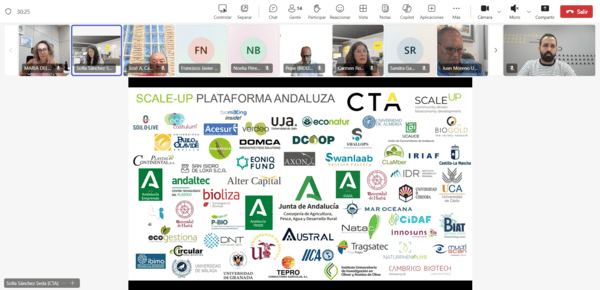
Our Final Newsletter Unlocks Three Years of Bioeconomy Innovation
After three incredible years of collaboration and innovation, the SCALE-UP project is coming to a close on August 31st 2025. We are so proud of what we have achieved together to support community-driven bioeconomy in Europe's rural areas.
This isn't goodbye, it's a 'see you forward'. We've compiled everything we've learned and created into our final newsletter, ensuring the knowledge and momentum continue long after the project ends.
We're leaving you with a toolkit for change, including:
- A comprehensive Guidance Framework for sustainable rural development.
- A practical Handbook of Social Innovation with inspiring examples.
- Region-Specific Information Packages tailored to local needs.
- Detailed insights and lessons from 12 new bio-based business models.
- A full Training Program to build capacity.
- Policy Briefs to help decision-makers create real impact.
...and more!
Our deepest gratitude goes out to every single person who has been part of this transformative journey. Your passion has been our inspiration!
Ready to dive in? Explore all these resources and more through our newsletter: SCALE-UP's Final Newsletter: Your Guide to Our Project's Results & Resources! | LinkedIn
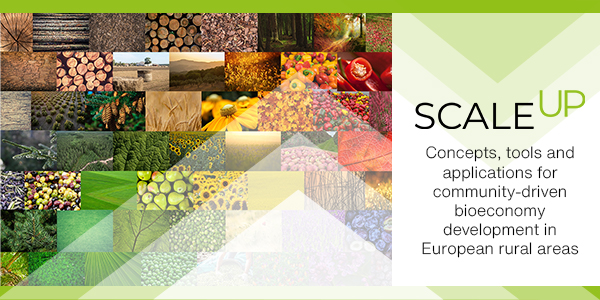
Turning Waste into a Resource: SCALE-UP Featured on Macedonian National Air Quality Platform
We are pleased to share that the SDEWES Skopje team has published an article on the Macedonian national air quality platform, highlighting how waste can be transformed into a valuable resource. This innovative approach not only contributes to improved air quality but also supports the creation of healthier soils, bringing clear benefits to both the environment and public health.
The article also features the SCALE-UP project as a concrete example of how innovation and research can directly support cleaner and more sustainable environments. By showcasing best practices from North Macedonia, the piece demonstrates how local initiatives can serve as models for wider European efforts to reduce pollution and foster circular economy solutions.
You can read the full article (in Macedonian) here: Cist Vozduh
This achievement highlights the strong collaboration within the SCALE-UP community and reinforces the project’s role in promoting solutions that tackle climate, air quality, and resource efficiency challenges.
Regional Platform for Bioeconomy – The road ahead after SCALE-UP
On 3 April 2025, stakeholders from the Bioeconomy platform in northern Sweden met for the final formal in-person meeting of the SCALE-UP project. The purpose of the meeting was twofold: to secure continued collaboration after the project’s conclusion, and to hand over responsibility for hosting the autumn meeting to a new host.
A day that raised more questions than it could answer
The meeting made it clear that a single day is barely enough to discuss all the ongoing activities, projects, and collaboration opportunities within the bioeconomy. Magnus Matisons provided a retrospective on past cooperation and lessons learned from SCALE-UP. Group discussions addressed global trends and changes – from technological advancements to new policy instruments, such as emissions trading, carbon credits, and adjustments to the reduction obligation.
Alternative fuels and market challenges
A key topic of discussion was the transition to alternative fuels. Questions arose about how producers and buyers can dare to invest, how to manage additional costs, and the role that increased self-sufficiency might play. The shipping industry’s transition was used as a concrete example of how the gap between regulatory requirements and ambition creates economic uncertainty. The consensus: regulatory decisions often determine the profitability of new fuels.
From forest to market – The entire value chain in focus
An ongoing theme was how to communicate the entire bioeconomy value chain, from forestry to the end customer. Piteå Science Park emphasized the need to showcase how modern, sustainable forestry works – both from a production and consumer perspective.
Collaboration and funding
Participants also discussed how regions can support funding applications, how joint ambitions can be incorporated into EU project proposals, and opportunities to utilise existing pilot plants as test environments. Digitalization, autonomous machinery, and precision forestry were highlighted as areas with significant development potential.
Collaboration ahead
Among the concrete ideas and planned activities that emerged during the day were:
- Workshops on business models, policies, and technology
- A meeting on renewable fuels for heavy machinery
- A shared map of northern Sweden’s research and facilities
- Exploring high-value products from bark and needles
- Showcasing northern Sweden’s innovation internationally to attract investment
We are looking forward to the September meeting, at which we will build on the collaboration that the SCALE-UP project has helped strengthen.
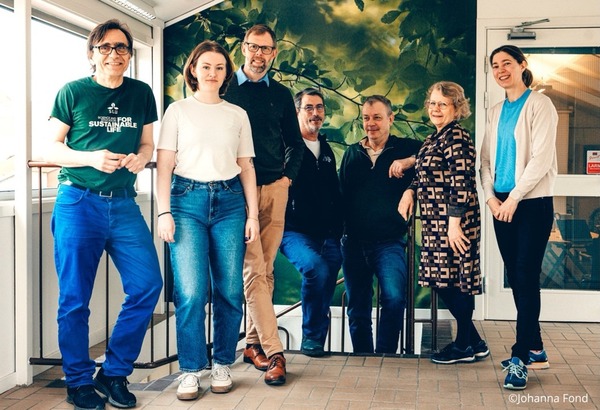
Regional bioeconomy in practice: The Upper Austrian bioeconomy platform as a model for systemic transformation
Innovative approaches, practical formats and a strong network: As part of the EU-funded SCALE-UP project, the Regional Platform for Bioeconomy in Upper Austria is demonstrating how the transition to a sustainable, bio-based economy can be successfully achieved.
The Horizon Europe project SCALE-UP aims to identify, strengthen and put into practice sustainable bioeconomic value chains. In Upper Austria, this goal is being implemented via a regional multi-stakeholder platform. As an institutional structure, the Regional Platform for Bioeconomy in Upper Austria is integrated into the advisory board of the Food Cluster Upper Austria, creating organisational and content-related synergies between sectoral cluster policy and transdisciplinary bioeconomy development. This model has proven to be particularly efficient, both in terms of resource use (e.g. infrastructure, personnel, participant time) and in terms of the strategic integration of bioeconomy issues into existing governance structures in Upper Austria.
Another success factor is the close involvement of relevant stakeholders – from food industry over research to chambers and advocacy groups. The platform serves not only as an information sharing hub and a discussion forum, but also as a catalyst for new projects. The experience gained in the project clearly shows that the active participation of these groups is a key prerequisite for enabling long-term investment, establishing legitimacy and ensuring that activities continue beyond the project boundaries.
In spring 2025, work also began on systematically transferring the knowledge gained within SCALE-UP to the region. In a first step, practice-oriented workshop formats for the structured analysis of biogenic residues in food processing – with a focus on vegetable processing – were successfully piloted. In these formats, representatives from companies and business networks worked together to identify previously unused side streams and to evaluate possible internal and external utilisation paths.
The practice-oriented workshops proved particularly effective in incorporating technological, economic and regulatory framework conditions into the discussion. Furthermore, the practical workshops proved to be a viable tool for accelerating bioeconomy businesses and projects. Building on this experience, practice-oriented workshops involving stakeholders actively are being planned – including the food retail and bakery sectors – to involve other key stakeholder groups and highlight industry-specific challenges.
The aim of these activities is to focus attention on unused biogenic resources within the region and within companies, promote cross-sector networking and identify concrete approaches for bioeconomic innovations through moderated exchange. In the long term, this should lead to new utilisation concepts and value creation partnerships that contribute to the implementation of regional bioeconomy strategies.
Conclusion: The Regional Platform for Bioeconomy in Upper Austria proves that regional structures can provide a viable basis for sustainable economic transformation – provided they are strategically embedded, practice-oriented and broadly supported.
“The bioeconomic transformation begins in everyday regional life – with new ideas, courageous networks and the will to rethink existing structures.”
— Gabriele Wolkerstorfer, Project Manager, Food Cluster Upper Austria
„The bioeconomy is not just a concept—it's a chance for regions to create green jobs, circular systems, and future-ready communities.”
-Alexander Pindur, Project Manager, Food Cluster Upper Austria
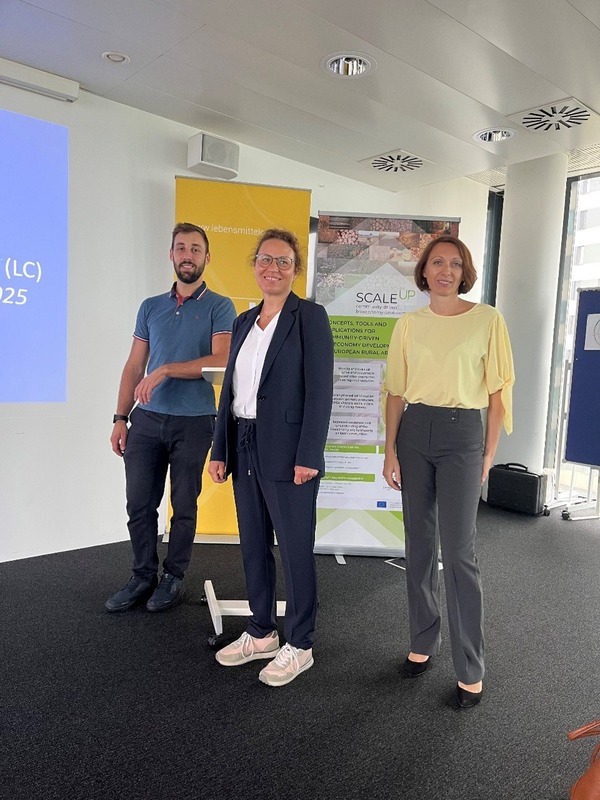
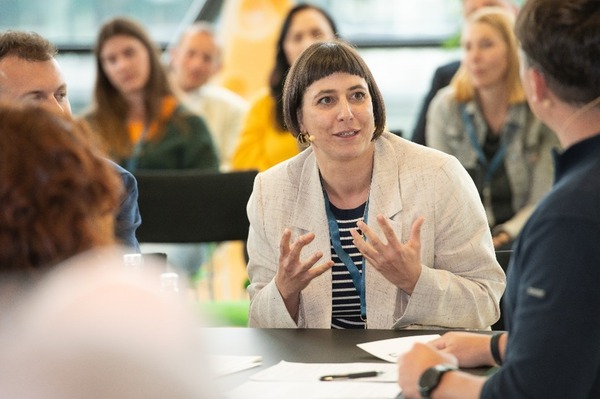
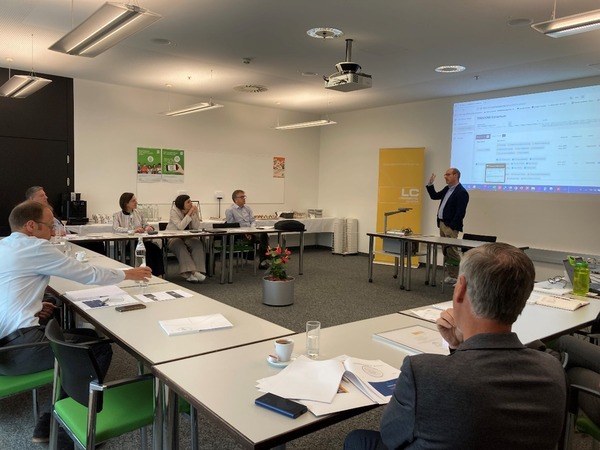

Sustainability plan for the SCALE-UP multi-actor platform in the French Atlantic Arc
The SCALE-UP project, launched in September 2022, will end on 31 August 2025. Its last platform meeting in France took place on 20 May 2025, gathering stakeholders from SCALE-UP and RuralBioUp projects. The event brought together some forty participants from businesses, research bodies, agriculture, associations and local authorities, who came from the four regions of the French Atlantic Arc (Normandy, Pays de la Loire, Brittany, New Aquitaine) to discover innovative projects and develop their networks (read the article to learn more).
All deliverables and resources from the project are made available, as well as the sustainability plan for its multi-actor platform to continue promoting the development of the bioeconomy and bio-based construction sectors. The future activities and cooperation resulting from the project will continue:
-
At interregional level: the four regional chambers of agriculture of the SCALE-UP platform’s steering committee are members of the chambers of agriculture’s Bioeconomy Club. This club is an internal working group of the chambers of agriculture at national level, aiming to coordinate bioeconomy activities, collaborate with regional stakeholders in the bioeconomy value chains, set up interregional projects and seek funding.
-
At regional level: SCALE-UP project has contributed to setting up cooperations among platform members, that will continue in each of the Atlantic Arc’s regions to further develop the bio-based building value chains:
-
In the Brittany region, the regional chamber of agriculture is working with local authorities and industrials to develop the hemp production. Together, they are conducting a feasibility study (building on WP2 biomass availability study and info pack) to set up a hemp processing unit on the territory. This investment will be essential to incite new farmers to produce hemp. Agricultural cooperative models (such as CUMAs) will be privileged to pool logistics (harvesting tools, storage, etc.).
-
Strong links have been forged between Brittany and Pays de la Loire regions thanks to the SCALE-UP platform activities, and stakeholders in Pays de la Loire are willing to develop hemp in Loire-Atlantique (the department bordering Brittany) to make use of the future hemp processing unit in Brittany and develop programmes like Terres de Sources with local authorities to plant hemp in water catchment areas to protect the resource.
-
In Normandy, the “Comité Filières” will replace the Novéatech committee (cluster of industrials working with biomass, created and animated by the Regional Chamber of agriculture of Normandy) and will carry out projects with the regional cluster for bio-based construction (ARPE). SCALE-UP has helped to strengthen partnerships with the regional wood and bio-based building clusters, and the regional chamber of agriculture is in the process of joining their sustainable building initiative (which aims to promote the construction and renovation of buildings to achieve high energy performance).
-
In New-Aquitaine, a farmers’ association dedicated to miscanthus has been set up to help structure the value chain.
-
- At European level: AC3A is member of the SCALE-UP Bioeconomy MetaCluster, and part of the thERBN project (Thematic European Bioeconomy Network). Participation in these initiatives will enable the sharing of knowledge and best practices among platform members to continue, as well as opportunities for partnership and funding at European level.
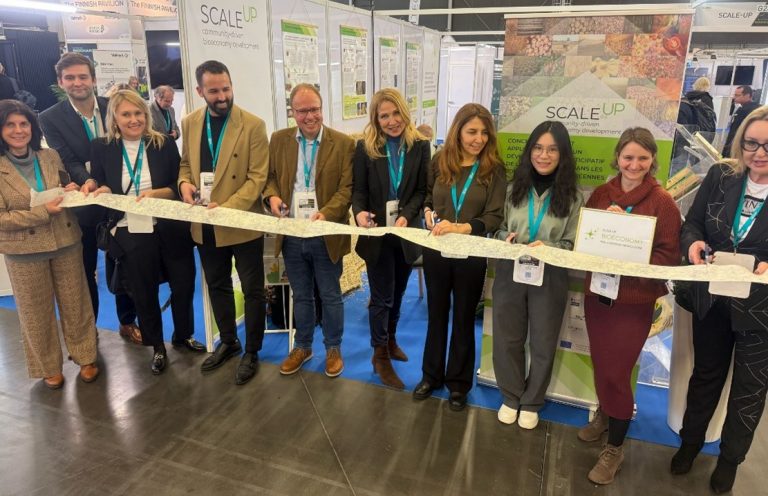
Final Regional Platform Meeting in Mazovia: Continuing the Path Toward a Sustainable Bioeconomy
On July 3rd, 2025, the final regional platform meeting of the SCALE-UP project was held in Warsaw, marking the end of a three-year collaborative effort to strengthen regional bioeconomy ecosystems across Europe. The event brought together stakeholders from government, research, business, and civil society to review achievements and plan the future of Mazovia’s bioeconomic development.
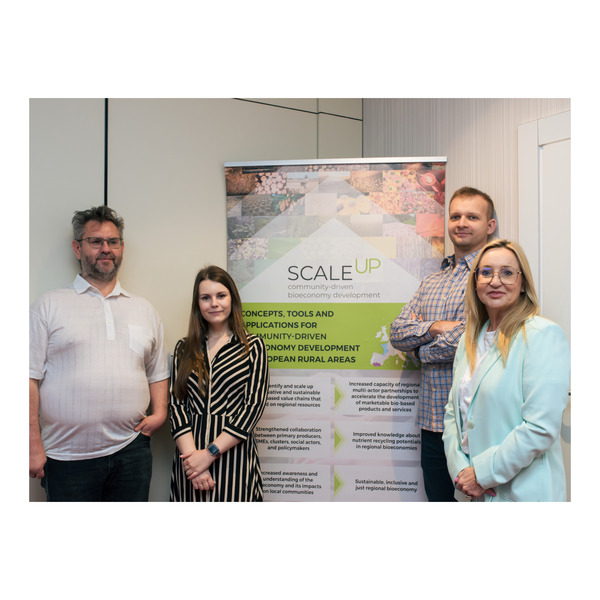
Reviewing Progress and Achievements
The meeting began with a summary of key milestones achieved by the Mazovian platform under SCALE-UP, including increased stakeholder engagement, enhanced regional policy coordination, and support for businesses. Participants emphasised how regional collaboration has laid a solid foundation for future progress.
Next Steps and Sustainability Beyond the Project
Discussions then shifted to future activities, including upcoming events, ongoing proposals, and securing funding from future EU programmes. Maintaining the platform's momentum through continued partnership and investment remains a key focus.
Alignment with the EU Bioeconomy Strategy
A presentation on the updated EU Bioeconomy Strategy sparked detailed discussions. The strategy emphasises more integrated, circular, and resilient approaches to bioeconomic growth. Its priorities—such as resource efficiency, sustainable food systems, and smart specialisation—are closely aligned with SCALE-UP’s goals and regional ambitions for Mazovia.
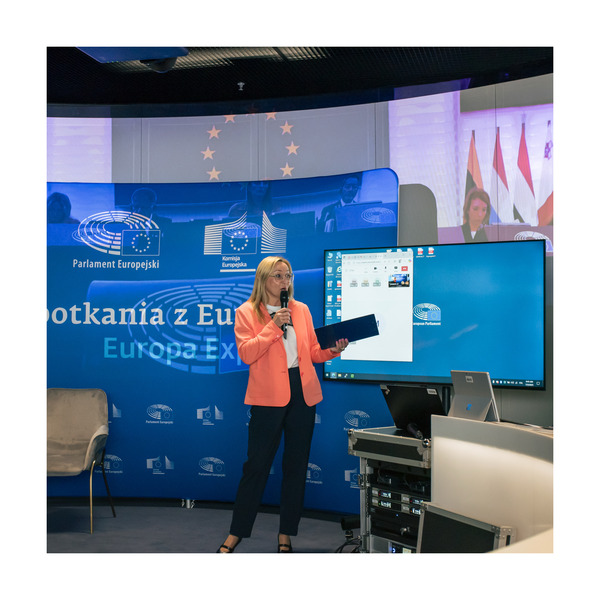
Cross-Project Synergies: PRECIOUS and ROSETTA
The event provided an opportunity to exchange knowledge with other significant EU projects, notably:
-
PRECIOUS, in which UNIMOS participates, aims to measure and reduce food loss and waste, creating a framework to assess the impacts of interventions across sustainability goals.
-
ROSETTA, also involving UNIMOS, focuses on marketing suboptimal food products to reduce waste and enhance supply chain efficiency.
These projects share goals and tools that complement each other, offering great potential for continued collaboration.
Metacluster Development and ECCP Recognition
A major outcome was positioning the Mazovia platform within the SCALE-UP Bioeconomy MetaCluster, a pan-European initiative to unlock the European bioeconomy's potential through collaboration among farmers, researchers, businesses, and policymakers. This ensures the project's lasting legacy by creating a hub for interregional cooperation, connectivity, and shared vision across Europe, supporting the transition to greener and more resilient rural practices. The metacluster’s adaptable framework facilitates cooperation across countries, regions, and sectors, empowering bioeconomy stakeholders to work toward a sustainable future.
Conclusion
Although the regional platform meeting marked the official end of SCALE-UP in Mazovia, it also launched a long-term structure for growth and innovation. Through strategic oversight, new partnership opportunities, and alignment with European priorities, the Mazovia platform—now part of the SCALE-UP metacluster—will continue to be a driving force for sustainable bioeconomic transformation in the region and beyond.
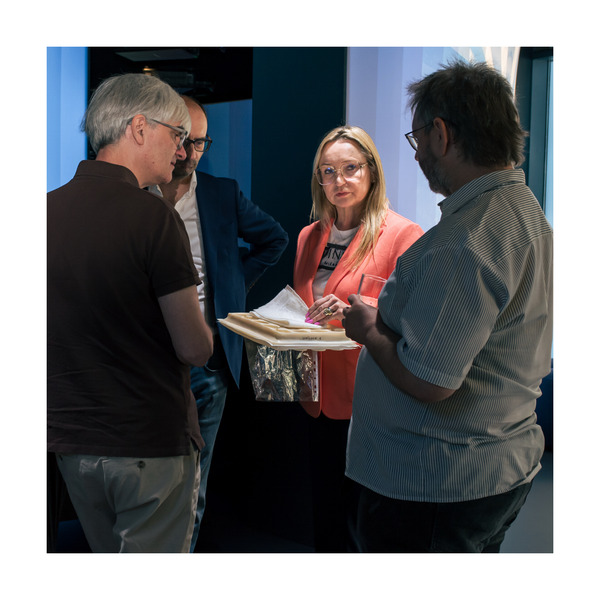
From Roots to Results: SCALE-UP’s Impact in Strumica

Strumica Municipality | July 1, 2025
On July 1, 2025, the final stakeholders’ meeting for the EU-funded SCALE-UP project was held in the Municipality of Strumica, North Macedonia. The event gathered 22 representatives from local government, NGOs, and the private sector, alongside the SDEWES-Skopje project team. The meeting marked the successful conclusion of project activities and initiated discussions on the future sustainability of the Strumica regional bioeconomy platform. Participants emphasized the many benefits the project brought to the region, such as increased knowledge, new partnerships, and practical ideas. They also expressed strong interest in continuing work in this field, with hopes for future support for specific initiatives like establishing a composting plant at the local high school and funding for the most promising innovative solutions developed during the project. The presentation of the meeting is available here.

Key SCALE-UP Project Achievements in the Strumica Region:
During the SCALE-UP project, Strumica made great progress in developing a strong local bioeconomy. One of the key activities was a training programme that took place across all project regions—not just in Strumica. A total of 21 training sessions were organized, reaching over 1300 participants, including farmers, business owners, NGO members, and municipal staff. These sessions helped people understand bioeconomy concepts and learn how to work together to bring new ideas to life. Many good examples and successful practices from Strumica and other parts of North Macedonia were shared during the trainings, showing how local experience can inspire and guide others.
At the same time, the regional bioeconomy platform in Strumica became an important space for cooperation and innovation. It is now closely connected with national goals and reform agenda and European strategies like the Green Deal, ensuring the work done in Strumica can continue and grow, as well as replicate in other municipalities and regions.
Young people were also a big part of the project. Over 90 students and 25 teachers from Dimitar Vlahov High School joined the “Bioeconomy through Art” activity. They came up with creative ideas like making wine stoppers from grapevine waste, producing natural cosmetics, farming with nettles, and turning old textiles into new products. These projects showed how young minds can help build a greener and more sustainable future.
Next Steps with the Municipality
A strategic follow-up meeting was held with high-level representatives from the Strumica municipal administration, focusing on environment, local economic development and project planning. The discussion centered on ensuring the long-term sustainability of the regional bioeconomy platform and identifying ways to secure future resources and institutional support.
“The knowledge and insights gained through SCALE-UP have empowered us to position Strumica as a leader in bioeconomy,” – Tomislav Andreev, Head of Environmental Protection Department
“This project showed how bioeconomy can boost Strumica’s local economy by increasing knowledge, networking, and creating new business opportunities,” – Toni Milushev, Head of Local Economic Development
“We now understand the value of structured stakeholder collaboration. Strumica regional bioeconomy platform is our gateway to long-term transformation,” – Pance Bedzovski, Advisor for Planning and Analysis
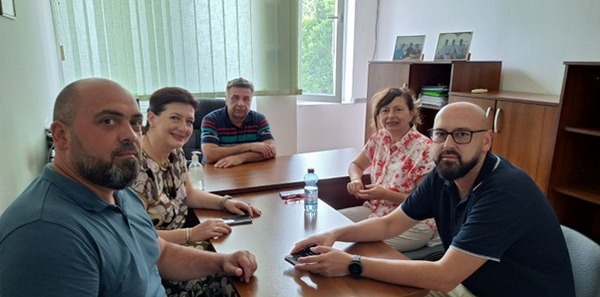
SDEWES-Skopje Reflections:
“The SCALE-UP project impact in Strumica has been powerful, creating a strong foundation for sustainable rural development. Along with this, it generated many co-benefits that support even wider goals like the EU Green Deal, helping bring positive change to rural areas like Strumica.” – PhD Natasa Markovska, President of SDEWES-Skopje
“We are proud to see local actors take ownership. You have set a clear example what sustainability looks like: built on people working together, backed by the local government, and involving everyone in the community.” – MSc Pavlina Zdraveva, SDEWES-Skopje
Stakeholders in the French Atlantic Arc mobilised to make the most of plant by-products and fibre plants
On 20 May 2025, the work of the European SCALE-UP and RuralBioUp projects was presented in Nantes on the Géraudière campus, as part of an event dedicated to the circular bioeconomy. Organised by Végépolys Valley and AC3A, in close cooperation with ONIRIS VetAgroBio and INRAE, the event brought together some forty participants from businesses, research bodies, agriculture, associations and local authorities, who came from the four regions of the French Atlantic Arc (Normandy, Pays de la Loire, Brittany, New Aquitaine) to discover innovative projects and develop their networks.
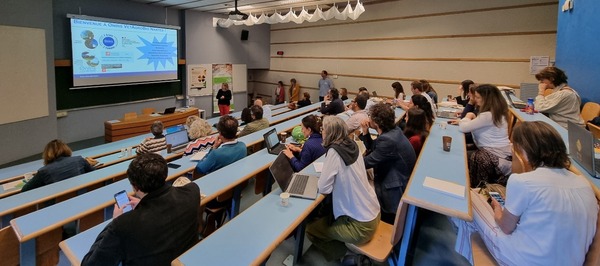
Welcomed on the campus of the ONIRIS engineering school, participants began the day with a plenary session dedicated to bioeconomy. Végépolys Valley and AC3A presented the results of two European projects, RuralBioUp and SCALE-UP, aimed at developing circular and sustainable bio-based value chains from locally available plant biomass resources. During their implementation, the two projects carried out networking activities, organised information sessions, and produced studies and tools to support the development of these sectors. As part of the public consultation for the update of the European strategy for the bioeconomy, the results of these and other Horizon Europe projects were presented along with policy recommendations for improving the regulatory framework and measures to support and finance bio-based industries. At the final project conference in Brussels on 14 May, the importance of strengthening the role of farmers in bioeconomy value chains was strongly emphasised (read more).
After the European news, a number of projects and approaches were presented, illustrating the diversity of initiatives and skills available in the region to convert by-products and fibre plants into bio-based products:
- The Bioloop project presented by ONIRIS is developing ways of recovering plant bioresources considered as waste, taking into account the noblest and most profitable use on a regional scale. This multi-disciplinary project took as its case study the spent grains from urban breweries to develop 100% recyclable biosourced materials, with a view to circular management on a regional scale.
- The aim of the Tetrae RAFFUT project, led by INRAE's Biopolymers Interactions Assemblages (BIA) unit, is to transform vegetable production residues into valuable resources, such as molecules of interest or bio-based materials, using a local biorefinery.
- The Pays de la Loire Chamber of Agriculture illustrated its work on the bioeconomy through a number of projects: RUSTICA (feasibility study for a regional bio-based fertiliser industry based on waste and by-products from the fruit and vegetable industry); VALOCEPS (recovery of vine stocks), thERN (thematic network on the recovery of residues and by-products from the animal, plant and forestry industries) and BUFFER+ (production of peat-free potting soils).
- Kellig Emren presented its biosourced and geosourced insulation panel for buildings, made from miscanthus, earth and lime. The panel offers numerous advantages, including winter and summer comfort, regulation of ambient humidity, fire resistance and reversibility at the end of its life.
- The Impro3D project presented by ONIRIS involves the construction of a collective 3D food printing workshop, the Fabrique Hal'Impro, to imagine, test and co-create new culinary applications using plant by-products, as part of an open innovation approach.
The morning ended with a visit to the ONIRIS food technology hall, a 3,000m² research facility with over 120 pieces of equipment (heat treatment, concentration, drying, packaging, etc.), which enables students to experiment with technological applications on industrial-scale tools.
After a time for sharing ideas and getting to know each other over lunch, the site visits resumed in the afternoon, with two options available to participants: those wishing to find out more about making use of plant by-products continued their visits to La Géraudière, while participants interested in bio-sourced buildings visited the commune of Les Touches.
At the La Géraudière site, participants were able to watch a demonstration of 3D printing of food products from plant by-products at the ONIRIS premises (Impro 3D project), and visit the INRAE - BIA laboratory and its facilities for characterising plant by-products and products from the RAFFUT project.
In Les Touches, participants were welcomed on visits to bio-sourced buildings by the town's first deputy mayor and the project manager from the Erdre et Gesvres Community of Communes. Together, they presented their ambitious eco-building policy, highlighting several completed and ongoing projects, and explaining the objectives, challenges and technical choices that have guided their design. In this town of 2,600 inhabitants, the former town hall has been renovated to become a health centre and a coworking space. The aim was to provide healthy, attractive spaces to encourage the installation of medical and paramedical professionals. The choice of bio-sourced materials was a major political decision, requiring the project management team to develop its skills. The head of the timber frame division at Atelier ISAC, a company with a long-standing commitment to the installation of bio-based products and trained in the installation of straw in its various forms (bales, panels, chopped straw, etc.), presented the companies involved in the project and the materials used, in particular the earth-hemp thermal corrector. The Petit-Mars Children's Centre project was also presented, which will use straw insulation panels from COPANO. The day ended with a visit to the restoration site of a farmhouse that will become a restaurant, partially renovated in hemp clay with a wooden extension clad in local wood from the commune. The Chanvre et Paysans association brought the day's presentations to a close with a presentation on the development of the hemp industry in Loire-Atlantique.
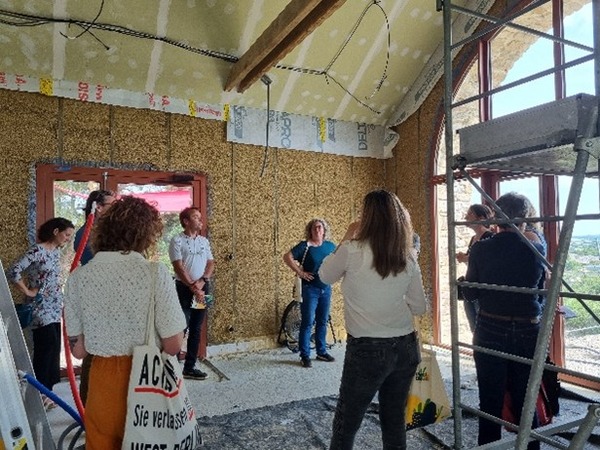
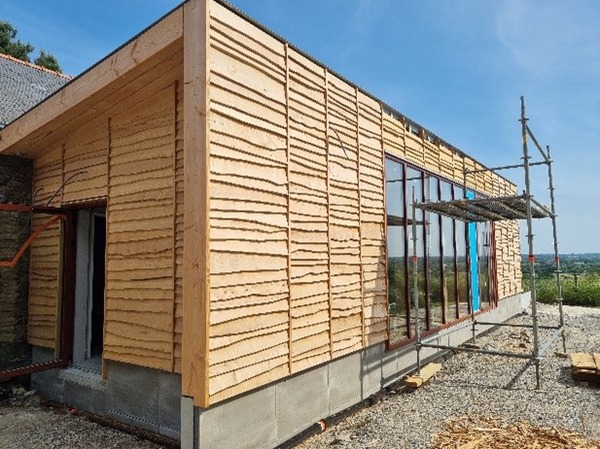
The event demonstrated the dynamism of the players in the Loire region on the subject of the bioeconomy, and the diversity of solutions for extracting value from by-products and fibre plants. Speakers and participants emphasised the importance of research and networking in developing innovative projects that make the most of local biomass resources, while respecting the hierarchy of uses and the environment. Following on from the RuralBioUp and SCALE-UP projects, Végépolys Valley, AC3A and the Chambers of Agriculture remain committed to raising awareness of these initiatives and contributing to the development of these sectors.
Find out more
SCALE-UP project resources: SCALE-UP - AC3A
RuralBioUp bioeconomy platform: RuralSpot - RuralBioUp
SCALE-UP Showcases Three Years of Rural Bioeconomy Impact at European Rural Circular Bioeconomy Conference
Horizon Europe initiative showcases tools, success stories, and collaborative strategies for a sustainable bioeconomy in Brussels
The SCALE-UP project took a central role in the highly successful European Rural Circular Bioeconomy Conference (EuRCBC) held on May 13-14, 2025, at Comet Louise in Brussels. As a member of the Rural Bioeconomy Alliance, SCALE-UP alongside five other EU-funded projects (MainstreamBIO, ROBIN, BioRural, BIOMODEL4REGIONS, and RuralBioUP) brought together stakeholders from local communities, policymaking, industry, and rural areas to discuss concrete pathways for accelerating Europe’s rural bioeconomy.
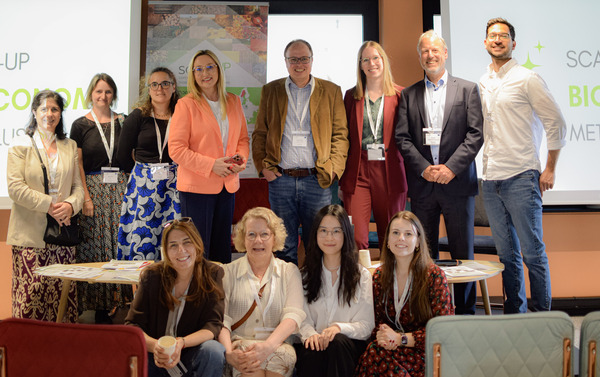
SCALE-UP Consortium at EuRCBC
Shaping the Future of EU Bioeconomy Strategy
The conference served as a crucial platform for high-level policy dialogue. Keynote speakers Michael Losch (DG AGRI, European Commission) and Marco Rupp (Bio-based Industries Consortium) emphasized the vital role of region-anchored projects like SCALE-UP in informing the forthcoming update of the EU Bioeconomy Strategy. Tomasz Calikowski (DG Research & Innovation, European Commission) further detailed the "Pathway towards the new EU Bioeconomy Strategy," outlining expected priorities, closer integration with biotechnology, and the anticipated publication of the revised strategy by the end of 2025.
In this forward-looking context, SCALE-UP actively contributed to the "Joint Policy Brief" on ‘Bridging Gaps and Addressing Challenges in the Rural Bioeconomy,’ translating project learnings into actionable policy recommendations.
SCALE-UP Highlights
The SCALE-UP team presented its key achievements and insights through various engaging formats:
- Project Perspective: Holger Gerdes, SCALE-UP Coordinator from Ecologic Institute, delivered a compelling "fire-pitch," outlining the project's mission to empower regional actors across its six diverse focal regions: Northern Sweden, Mazovia (Poland), the French Atlantic Arc, Upper Austria, Strumica (North Macedonia), and Andalusia (Spain). Zoritza Kiresiewa, also from Ecologic Institute, participated in a dynamic panel discussion, exploring how SCALE-UP and other projects employ complementary approaches to enhance the EU’s bioeconomy.
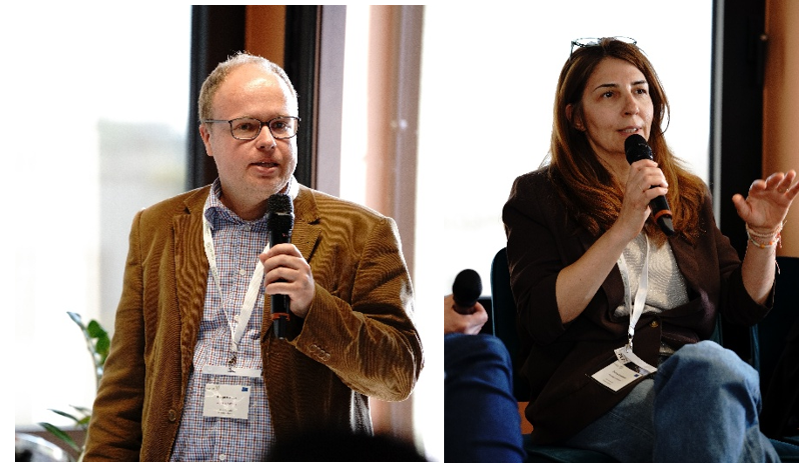
SCALE-UP Coordinator Holger Gerdes and Zoritza Kiresiewa showcasing our concepts and perspectives
- Tools for Advancing Bioeconomy:
- Alexander Pindur from Business Upper Austria presented SCALE-UP's demand-driven training programme and knowledge exchange activities, designed to build capacity among regional stakeholders.
- Frans Feil from Biomass Technology Group showcased the comprehensive SCALE-UP Information Packages, which provide practical knowledge on biomass availability, nutrient recycling, and bio-based solutions tailored to regional contexts.
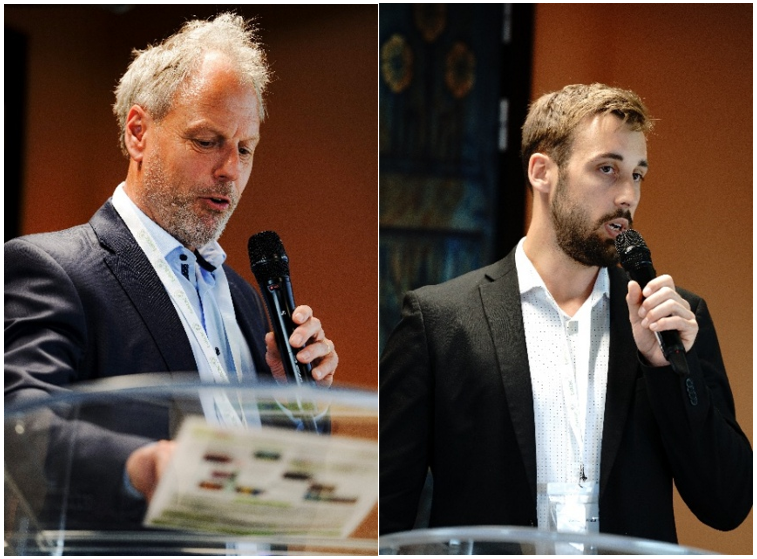
SCALE-UP Project Partner Frans Feil and Alexander Pindur presenting our results
- Inspiring Change through Success Stories: Gerardo Anzaldúa from Ecologic Institute shared insights from SCALE-UP’s work, highlighting real-world applications and policy needs identified through the project’s innovation support programme, which has engaged with innovators like Copano (straw-based insulation) and Bioliza (olive waste pyrolysis).
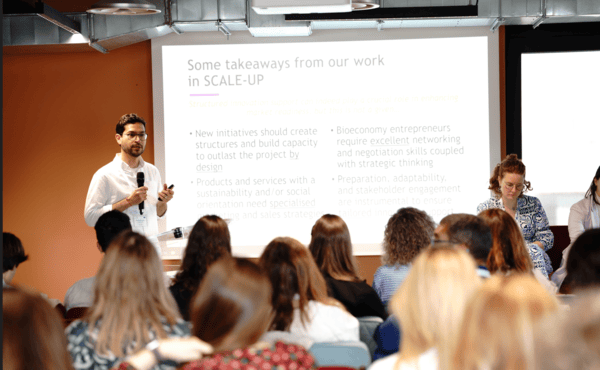
SCALE-UP Coordinator Gerardo Anzaldúa underscore the key takeaways
"The European Rural Circular Bioeconomy Conference was an invaluable event for SCALE-UP to share its progress and collaborative tools," said Rainer Janssen, Managing Director at WIP Renewable Energies, "Our focus is on empowering local and regional actors with the knowledge and networks they need to transition towards a truly sustainable and circular bioeconomy. The engagement and shared learnings from this event will further fuel our efforts in our six focal regions and beyond."
The spirit of collaboration and knowledge-exchange was palpable throughout the EuRCBC. Roundtables, interactive corridor conversations, and live tool demonstrations armed participants with critical data, new contacts, and actionable playbooks to implement Green Deal-compliant bio-based value chains in their respective regions.
A unique highlight was a live-scribe artist who captured the conference's intellectual flow in real time, creating a sweeping “river of ideas.” This visual narrative artfully threaded together the six projects, the innovative training and information toolkits, and key takeaways from the diverse panel discussions, serving as a living agenda and a vibrant shared memory that continually sparked new dialogue among delegates.
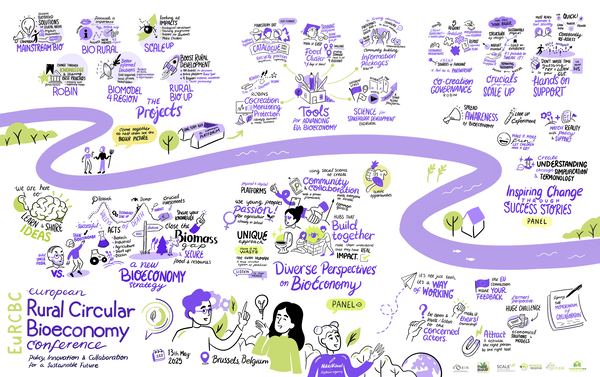
EuRCBC’s “river of ideas”
About SCALE-UP
SCALE-UP (Concepts, tools and applications for community-driven bioeconomy development in European rural areas) is a Horizon Europe funded project. It supports regional multi-actor partnerships, consisting of private businesses, governments and policymakers, civil society organisations, and researchers in identifying and scaling-up innovative and sustainable bio-based value chains that build on regional resource.
Follow us on our LinkedIn, X and Instagram.
Mark Your Calendars: European Rural Circular Bioeconomy Conference Comes to Brussels (May 13-14, 2025)
Six Horizon Europe Projects Collaborate to Advance Sustainable Rural Solutions
Get ready to delve into the forefront of sustainable rural development! We are excited to announce the European Rural Circular Bioeconomy Conference, taking place on May 13-14, 2025, at the Comet Louise center (6th floor) in Brussels, Belgium.
This pivotal two-day event is a collaborative initiative driven by six leading Horizon Europe projects: MainstreamBIO, ROBIN, SCALE-UP, BioRural, BIOMODEL4REGIONS, and RuralBioUP. As active members of the Rural Bioeconomy Alliance (RBA), these projects are uniting to create a dynamic platform focused on driving innovation, shaping policy, and showcasing real-world applications within Europe’s burgeoning circular bioeconomy.
Connecting Innovation, Policy, and Practice
Recognizing the critical role of the circular bioeconomy in achieving Europe's Green Deal objectives and fostering rural resilience, this conference aims to bridge the gap between research, policy, and practical implementation. It will bring together key stakeholders – including policymakers, industry leaders, researchers, entrepreneurs, rural community representatives, and business support organizations – for impactful discussions and knowledge sharing.
What to Expect:
Over two insightful days, the conference will offer a comprehensive exploration of the key drivers shaping Europe’s rural bioeconomy:
- Day 1 (May 13th): Focuses on laying the groundwork. Sessions include:
- A keynote speech from Marco Rupp (Biobased Industries Consortium).
- Rapid-fire "Fire-pitching" presentations from the six hosting projects.
- Panel discussions exploring diverse bioeconomy perspectives, practical tools for advancing sustainable practices, and inspiring success stories from across the regions.
- A significant signing ceremony for a Memorandum of Collaboration among ROBIN project regions.
- Day 2 (May 14th): Shifts towards future strategy and implementation. Highlights include:
- A keynote on the pathway towards the new EU Bioeconomy Strategy by T. Calikowski (DG Research and Innovation, European Commission).
- Presentation of joint policy observations from several hosting projects.
- Parallel morning workshops focusing on:
- Policy Roundtable on implementing small-scale bio-based solutions (MainstreamBIO).
- A practical Train-the-Trainer Workshop on scaling the bioeconomy using ROBIN's toolbox (Remote connection available for this workshop).
- An International Mobilisation and Mutual Learning Workshop on building regional partnerships (RuralBioUp & BIOMODEL4REGIONS).
Why Attend?
This conference is an unmissable opportunity to:
- Network: Connect with leading experts, potential collaborators, and key decision-makers.
- Learn: Gain insights into the latest tools, strategies, and successful case studies in the rural bioeconomy.
- Contribute: Participate in discussions shaping future policies and support mechanisms.
- Discover: Explore innovative bio-based solutions driving sustainable change in rural areas.
Participation Options:
Attendees can join the conference onsite in Brussels for the full immersive experience. For those unable to travel, remote online access will be available for all sessions on Day 1 (May 13th) and specifically for the ROBIN 'Train-the-Trainer' Workshop on Day 2 (May 14th). Registered participants opting for remote access will receive connection links via email.
Secure Your Place!
Registration for the European Rural Circular Bioeconomy Conference is now open. Don't miss this chance to be part of a crucial conversation shaping a sustainable and resilient future for rural Europe.
Registration Deadline: May 2nd, 2025
- To Register, please visit: Registration Link
- View the Full Conference Agenda: Agenda
Join us in Brussels to collaborate, learn, and drive the future of the European rural circular bioeconomy!
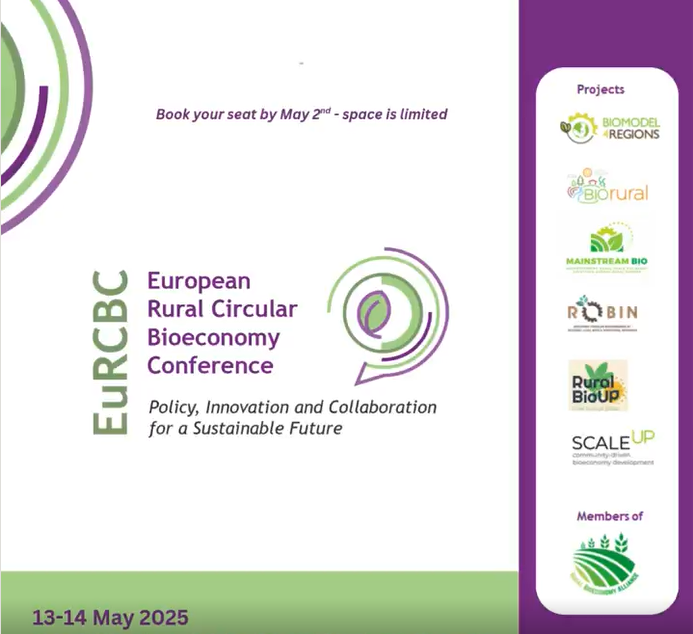
Spring 2025 Edition Newsletter of the SCALE-UP Project is Available!
Welcome to the Spring 2025 edition of the SCALE-UP project Newsletter! We’re excited to share our upcoming European Rural Circular Bioeconomy Conference, new training materials, and inspiring developments that are propelling Europe toward a greener, more resilient future.

SCALE-UP Project Wraps Up a Successful Show at Bio360 in Nantes, France
The SCALE-UP project is proud to announce the successful conclusion of its participation at Bio360, held on 5 and 6 February 2025 at Nantes, France. The international trade fair, dedicated to advancing the bioeconomy, drew more than 450 exhibitors and 40+ conferences featuring pioneering solutions in bio-based materials, circular agriculture, and renewable energy.
Dynamic Presence at SCALE-UP Stand
SCALE-UP’s presence at Stand G28 offered a dynamic space for showcasing solutions in biomass valorization and sustainable resource management. Farmers and industry professionals alike converged at the stand to explore new market opportunities, discuss regulatory challenges, and forge partnerships.
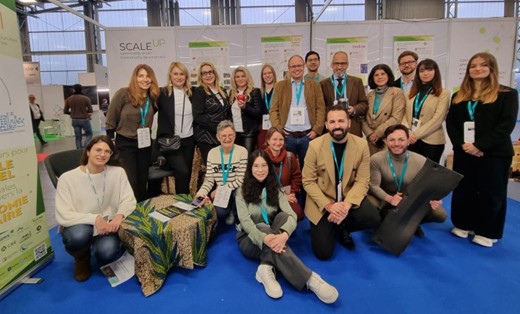
Figure 1 SCALE-UP project consortium, innovators, and sister projects BioRural and RuralBioUp
Conference Spotlight: “Scaling-Up Innovations in Bioeconomy”
On 6 February, SCALE-UP hosted a well-attended conference titled “Scaling-up Innovations in Bioeconomy: A Lever for Europe’s Green Transition and Rural Development.”
- Five Entrepreneurs from France, Spain, and Poland showcased how agricultural by-products—ranging from hemp and straw to olive residues and apple pomace—can be turned into high-value, eco-friendly products such as insulation materials, biochar, biopolymers, and functional foods.
- A lively discussion, facilitated by by Gerardo Anzaldua from Ecologic Institute, offered insights into market entry, funding mechanisms, and policy enablers crucial to scaling up these promising ideas.

Figure 2 SCALE-UP conference at BIO360
Flagship Bio-Based Innovations
Among the many innovations supported by the SCALE-UP project, five solutions were highlighted on-site at Bio360, each demonstrating how local resources can be turned into impactful products:
- ANDALTEC (Spain) – COMPOLIVE Spin-Off
Develops bio-composites from olive tree pruning residues, already prototyped for the automotive and furniture sectors.
- BIOLIZA (Spain)
Converts olive waste into biochar and syngas using advanced pyrolysis and gasification, enabling companies to reduce fossil fuel dependency.
- Atelier du Biosourcé (France)
A cooperative hub that pools resources and expertise to integrate plant-based materials into Normandy’s construction industry.
- COPANO (France)
Manufactures low-tech straw insulation panels, requiring no binders or chemical additives, for both new construction and retrofit applications.
- Biocircular Apple Farm (Poland)
An educational orchard serving as a testbed for circular bioeconomy solutions, from innovative product development to hands-on training programs.

Figure 3 Samples of our innovators
Beyond Bio360
While these five innovations took center stage at Bio360, SCALE-UP also supports a wide range of other regional initiatives underscoring the breadth of Europe’s bioeconomy:
Northern Sweden
- Reselo: Extracts suberin from birch bark to produce fossil-free rubber.
- Wood Fuel Network: A social innovation to restart logging residue extraction through coordinated value-chain mobilization.
Mazovia, Poland
- Apple Pomace Innovations: Creating healthy, functional products from apple by-products.
Strumica, Macedonia
- Bio-Compost Machine: Converts organic waste into fertilizer, reducing pollution.
- Machine for Fine Grinding Residues: Produces bio-fertilizer by breaking down plant waste.
Upper Austria
- SUN Project (Velvety Manufaktur GmbH): Protein extraction from sunflower press cake for food, cosmetics, and pharmaceuticals.
- Streuobstwerkstatt e.U.: Maximizing returns for farmers through high-value uses of meadow orchards.
Launch of the MetaCluster on Social and Ecological Innovation
A major milestone during Bio360 was the official launch of the MetaCluster on Social and Ecological Innovation in the Bioeconomy (metaCSEI). This new, voluntary partnership unites the six SCALE-UP regional platforms, the broader Community of Practice, and other innovation agents committed to fostering bio-based social and ecological innovations—particularly in rural development contexts.
- Governance & Roadmap: The metaCSEI will establish a governance structure, decision-making processes, and a three-year roadmap outlining multiple funding possibilities.
- Registration with ECCP: Following the signing of the meta cluster agreement, metaCSEI will be registered with the European Cluster Collaboration Platform (ECCP) to elevate its visibility and expand collaborative opportunities.

Figure 4 MetaCluster ribbon-cutting ceremony at BIO360
Looking Ahead
The enthusiastic response at Bio360 underlines the mounting momentum for the bioeconomy as a key pillar of Europe’s green transition. By providing a suite of tools, networking opportunities, and advisory services, SCALE-UP empowers regions to convert local biomass and co-products into market-ready solutions, balancing environmental imperatives with economic viability.
“Our conference and stand at Bio360 clearly showed how regional innovations, collaborative networks, and bold entrepreneurial efforts can accelerate the shift to a circular bioeconomy. We look forward to continuing this work and expanding our community of practice across Europe.” — SCALE-UP Project Coordinator
About SCALE-UP
SCALE-UP is a European-funded project that aims to establish and enhance regional multi-actor partnerships—encompassing private businesses, governments, policymakers, civil society organizations, and researchers—to identify and scale up innovative and sustainable bio-based value chains. By leveraging local resources and providing targeted support, SCALE-UP helps unlock the full potential of the bioeconomy in each region.
For more information on the SCALE-UP project, please visit www.scaleup-bioeconomy.eu or follow us on social media: LinkedIn, Instagram and X.
Thank you to everyone who engaged with us at Bio360—together, we’re fueling a more resilient and innovative European bioeconomy.
BIO360 2025: SCALE-UP to Showcase Breakthrough Bioeconomy Innovations, Driving Europe’s Green Transition
As Europe strides toward a greener future, the SCALE-UP project stands at the forefront of transforming rural economies and agricultural by-products into high-value, sustainable products. On February 5 and 6, 2025, SCALE-UP will take center stage at BIO360 in Nantes, demonstrating how innovative bio-based solutions can enrich rural communities, accelerate Europe’s green transition, and turn once-overlooked residues into valuable, market-ready commodities.
SCALE-UP at BIO360: Stand G28
Throughout both days of the event, attendees are invited to connect with the SCALE-UP team at Stand G28, from 9:00 to 11:00 a.m. This hands-on hub will offer insights into how SCALE-UP, a Horizon Europe initiative, guides entrepreneurs, farmers, and innovators in tapping into the hidden potential of agricultural co-products. Visitors will learn about cutting-edge methods for crafting biochar and biopolymers from olive residues, producing high-quality insulation from hemp and straw, and even transforming apple pomace into nutritious, functional foods.
Engage directly with the experts who are translating theory into practice—identifying market opportunities, forging strategic partnerships, and building resilient supply chains that enhance rural livelihoods while protecting the environment. SCALE-UP’s network brings together a range of stakeholders, including entrepreneurs, researchers, and policy advisers, to ensure that good ideas don’t just stay on paper but become realities that spur economic growth and ecological well-being.
Don’t Miss the SCALE-UP Conference: 6 February (10:00–11:00 a.m.)
For a deeper dive, attend the SCALE-UP conference on February 6 in the Circular conference room, from 10:00 to 11:00 a.m. Here, five pioneering entrepreneurs from France, Spain, and Poland will share their personal journeys. Their stories revolve around turning simple raw materials—hemp, straw, olive pruning residues, and apple by-products—into solutions such as eco-friendly building materials, biochar, biopolymers, and specialty food ingredients.
These entrepreneurs will discuss how they navigate the path from innovative ideas to full-scale commercialization, exploring challenges like market access, consumer acceptance, and regulatory frameworks. Moderated by SCALE-UP experts, the session will highlight real-world problem-solving, strategic business development, and the invaluable support that initiatives like SCALE-UP provide as these trailblazers open doors to Europe’s sustainable future.
Why SCALE-UP Matters
At a time when the agricultural sector faces increasing pressures to reduce waste and lower its carbon footprint, SCALE-UP’s approach exemplifies how innovation can be both profitable and principled. By identifying and nurturing start-ups and SMEs that valorize by-products, SCALE-UP empowers rural communities to diversify income streams, adapt to new market realities, and minimize their environmental impact. These solutions aren’t just incremental improvements; they’re catalysts for creating a circular bioeconomy that resonates across European regions.
Join the Conversation at BIO360 2025
BIO360 provides the perfect stage for SCALE-UP to share successes, forge new collaborations, and inspire the next wave of bio-based entrepreneurship. Whether you’re an investor, researcher, producer, or policy influencer, your participation at Stand G28 and the SCALE-UP conference can open new avenues for sustainable growth. By bridging the gap between local resources and global markets, SCALE-UP proves that Europe’s bioeconomy is not only a vision for the future—but a tangible, thriving reality we can all help shape today.
Take a quick look at the programme here.
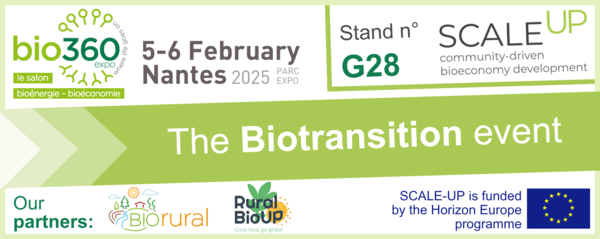
Fifth Meeting of the Regional Stakeholder Platform Held in Strumica
On December 5th, SDEWES-Skopje organized the fifth meeting of the Regional Stakeholder Platform in Strumica as part of the SCALE-UP project. The event, held alongside the student competition, brought together 10 participants, including representatives from SDEWES-Skopje, the Municipality of Strumica, and two local NGOs.
The primary objective of the meeting was to facilitate collaboration and knowledge sharing among stakeholders to advance the implementation of bio-based solutions in rural areas.
Meeting Agenda
- Presentation and Discussion
- A detailed review of the Report on Guidelines for Designing, Implementing, and Monitoring Small Bio-Based Solutions in Rural Areas.
- Hands-on Exercises and Innovation Discussion
- Practical exercises focused on bio-based solutions utilizing the MAF+ platform.
- A comprehensive discussion on the Innovation Support Program Report and its implications for rural communities.
The meeting encouraged active participation, with attendees exchanging insights and exploring strategies to enhance the design and adoption of small-scale, bio-based innovations. Emphasis was placed on fostering sustainability, supporting innovation, and promoting economic resilience in rural regions.
The regional platform remains committed to its mission of empowering stakeholders with the tools and knowledge needed to implement practical, eco-friendly solutions. These initiatives play a vital role in addressing local challenges while contributing to regional sustainability goals.
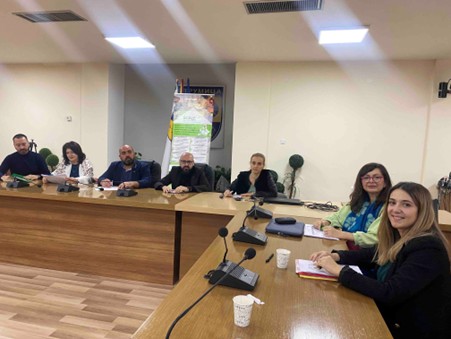
Celebrating Innovation in Sustainability: Highlights from the student competition “Bioeconomy Through Art”
On December 5, 2024, the “Bioeconomy Through Art” competition, organized by SDEWES-Skopje under the Horizon Europe SCALE-UP project, brought sustainability to life through the creativity of Dimitar Vlahov High School students in Strumica.
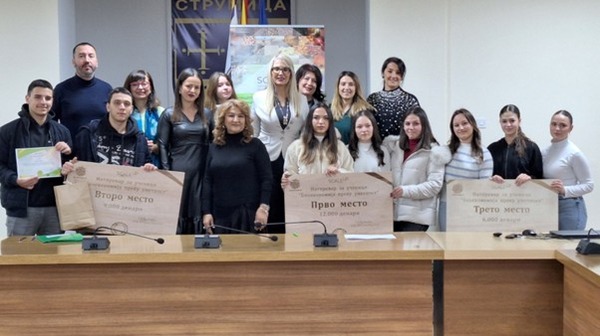
With 90 participants, 50+ students, and 25 teacher mentors in 20 teams, the event showcased ground-breaking ideas like:
- Wine stoppers from grapevine bio-waste
- Sustainable cosmetics: from eyeliner to flowers
- Recycling and upcycling projects
- Nettle-based organic farming
- Textile innovations: waste transformed into art
- Natural colors, eco-friendly soap, and kombucha leather
Winning teams were evaluated for innovation, feasibility, sustainability, and community impact by a distinguished jury.
The event also featured a guest presentation by a young entrepreneur from Skopje, highlighting bio-based cosmetics marketed through digital platforms—a prime example of combining sustainability with entrepreneurship.
This inspiring event was supported by the Dimitar Vlahov school, local teachers, and the Municipality of Strumica. It was covered by two national TV outlets, which conducted interviews to highlight the importance of youth-driven innovation in tackling global challenges.
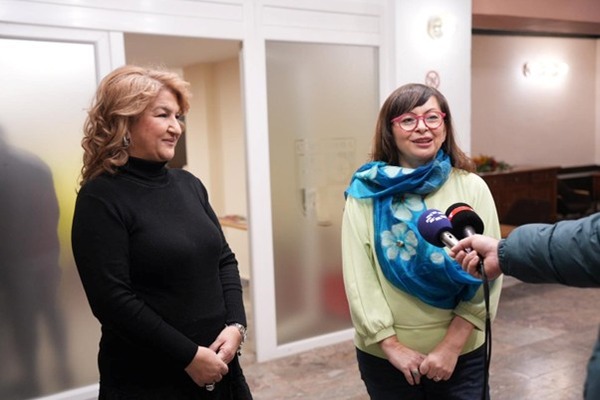
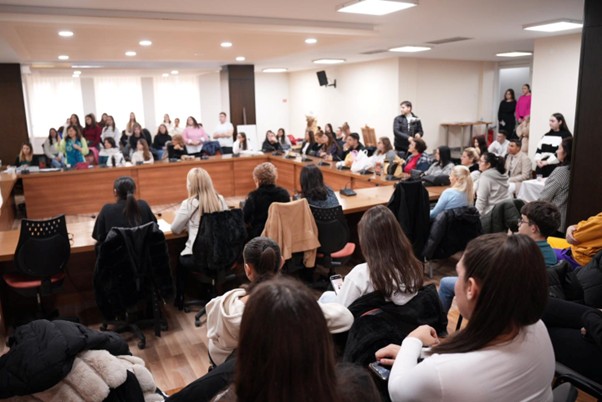
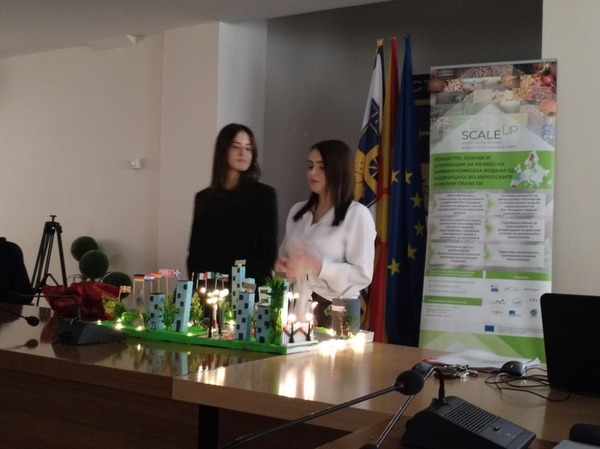
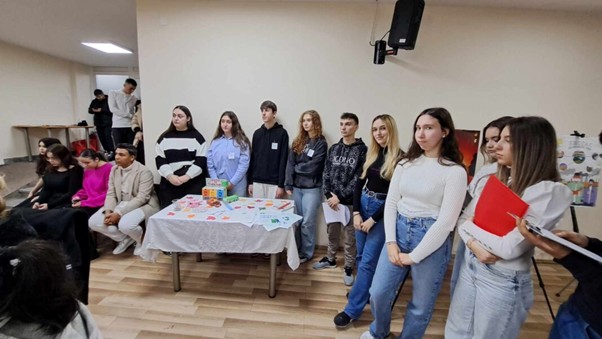
SCALE-UP Project Partner CTA Engages Over 80 Students in Innovative Olive Bioeconomy Competition
The Technological Corporation of Andalusia (CTA), a partner in the European SCALE-UP project, organised the "Express Ideas Competition: Let’s Undertake in the Olive Grove!" in Churriana de la Vega, Granada. This event brought together more than 80 students from the agricultural vocational training branch of IES Federico García Lorca to develop innovative business ideas using olive residues.
The competition, supported by Andalucía Emprende and the Institute for Agricultural and Fisheries Research and Training of Andalusia (IFAPA), served as an inspiring platform to educate young people on circular economy principles while fostering entrepreneurial skills.
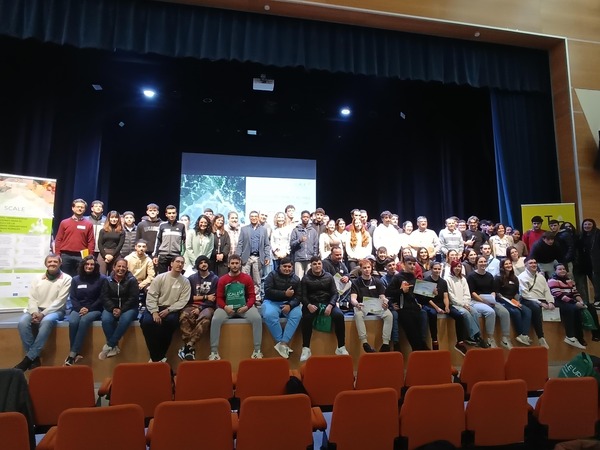
A Focus on the Olive Bioeconomy
Andalusia, home to over 1.65 million hectares of olive groves, generates significant olive by-products such as leaves and pits. These by-products hold vast potential for industrial applications. The SCALE-UP project aims to highlight the value of these residues through initiatives like this competition, linking bioeconomy principles to local resources and opportunities.
Students from Gardening and Floristry, as well as Forestry and Natural Environment Management courses, engaged in group dynamics to develop innovative products or services utilising olive waste. The competition concluded with a pitch session, where 13 teams presented their ideas to a jury of experts in agriculture and entrepreneurship. The winning team, Hojiblanca, impressed the panel with their creation of a bioplastic made from olive grove residues, demonstrating the potential of circular economy solutions in the bioeconomy.
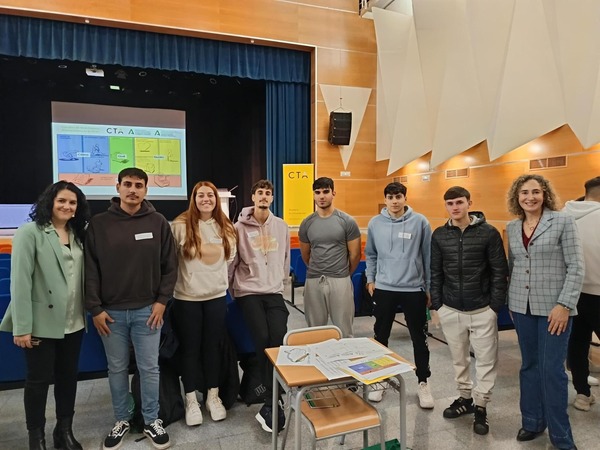
Collaboration and Community Support
The event was backed by key institutions, including Andalucía Emprende, the IFAPA Camino de Purchil centre, and the Regulatory Council of the Designation of Origin Poniente de Granada. The Mayor of Churriana de la Vega, Antonio Narváez, and Councillor for Education and Sports, María Roda Marcos, actively participated, praising the initiative's role in connecting youth with bioeconomy and innovation. Narváez highlighted the participatory and innovative nature of the competition, stating, “This event brings our young people closer to the bioeconomy and technology, preparing them for future employment opportunities while fostering creative thinking.”
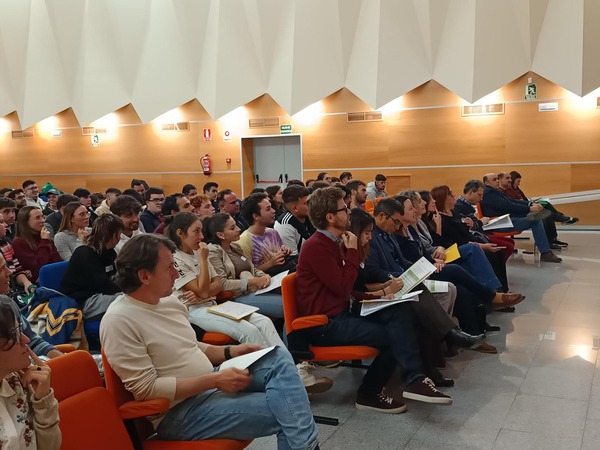
About SCALE-UP
SCALE-UP is a Horizon Europe-funded project that promotes scaling up innovative biomass-based solutions across six European regions. In Andalusia, olive residues serve as a focus for inspiring bioeconomy applications, with initiatives like this competition showcasing the project’s commitment to community engagement and innovation.
Through events such as this, the SCALE-UP project not only empowers students but also drives the local bioeconomy forward, creating sustainable solutions and fostering future entrepreneurs.
Exciting Student Competitions in the SCALE-UP Project!
We are excited to announce the launch of student competitions across six regions as part of the SCALE-UP project! These competitions offer high school and university students an incredible opportunity to engage in innovative challenges centered around the bioeconomy and sustainable solutions.
Participants will have the chance to showcase their creativity, collaborate with peers, and contribute to building a sustainable future for our environment. Competitions will be held in the following regions:
- Upper Austria, Austria
- Mazovia Region, Poland
- Andalusia, Spain
- The French Atlantic Arc, France
- Northen Sweden
- Strumica Region
Each region will host unique challenges tailored to local needs and opportunities. Whether you're passionate about bio-based products, green technologies, or entrepreneurial innovations, there’s something for everyone!
Why Participate?
- Present your innovative solutions
- Gain practical experience in the bioeconomy sector
- Win exciting prizes and receive recognition
- Make an impact on your community and contribute to global sustainability goals
For detailed information on each regional competition, including dates, requirements, and submission guidelines, please refer to the regional flyers linked below.
- Upper Austria, Austria
- Mazovia Region, Poland
- Andalusia, Spain
- The French Atlantic Arc, France
- Northen Sweden
- Strumica Region
Stay tuned and join us in shaping a greener future!
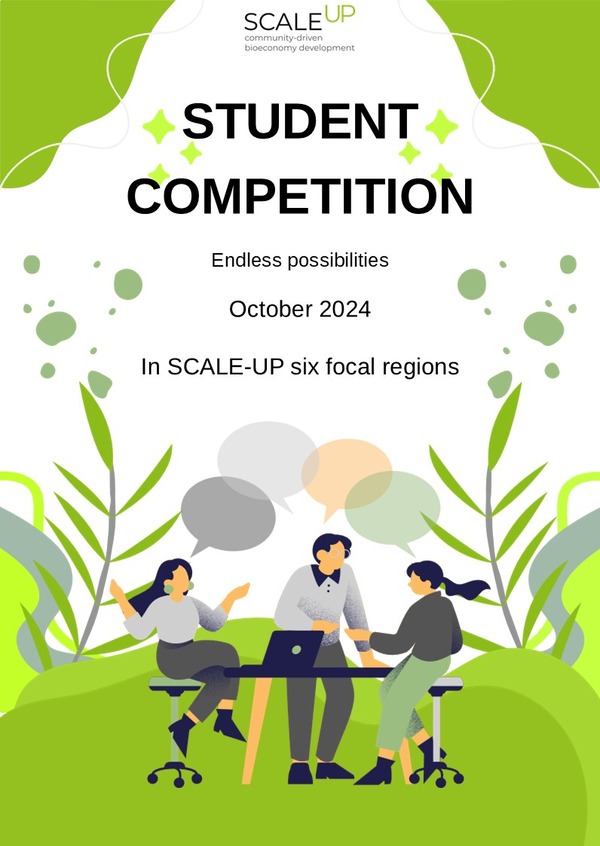
Bioeconomy Days in Sweden: A Deep Dive into Forest Sustainability and Innovation
On 17-18 September 2024, we visited Umeå, Northern Sweden, to explore the forest bioeconomy, a regional economic pillar for over 150 years. This tour offered insights into 100 years of history, modern forestry, and the challenges faced by forest owners today. We heard from local producers, innovators, cooperatives, and clusters about strengthening the bioeconomy. The SCALE-UP project consortium discussed the Innovation Support Programme, covering social and ecological innovations, and fostering EU project collaboration.
A guided forest walk showcased sustainable forestry practices and technology-driven approaches. We gained valuable insights into bio-innovations and enjoyed networking opportunities, truly advancing the SCALE-UP project and regional partnerships.
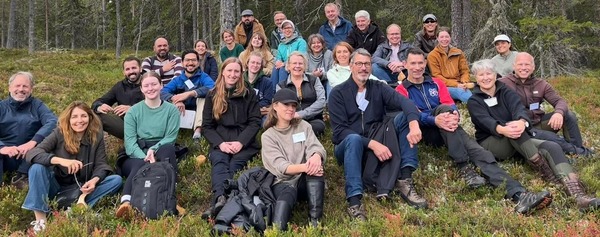
Passion for Sustainability Ignites at Strumica Event
On June 6, 2024, forty passionate individuals from diverse backgrounds converged in Strumica for a dynamic discussion on environmental protection and sustainable development. This impactful event reinforced our collective commitment to safeguarding biodiversity and championing eco-friendly practices.
Attendees benefited from insightful presentations on pressing environmental concerns. Macedonian Forests highlighted the devastating effects of illegal logging and advocated for stricter conservation measures. The Institute for Biometric Research in Skopje emphasized the critical role of air quality monitoring in promoting urban sustainability and improving public health.
A key highlight was the presentation by SDEWES-Skopje, showcasing the SCALE-UP project's innovative efforts to develop a thriving bioeconomy in rural areas. Their work exemplifies how economic growth can be achieved in tandem with environmental sustainability.
The event culminated in the identification of actionable strategies to increase bio-based production within ecological limits. These strategies include:
- Enhancing knowledge exchange on biomass
- Improving biomass selection from agro-factories
- Promoting integrated composting systems
Looking ahead, we are excited about the upcoming student competition in Strumica and the continued development of the MAF+ platform, both of which will drive the adoption of bio-based solutions.
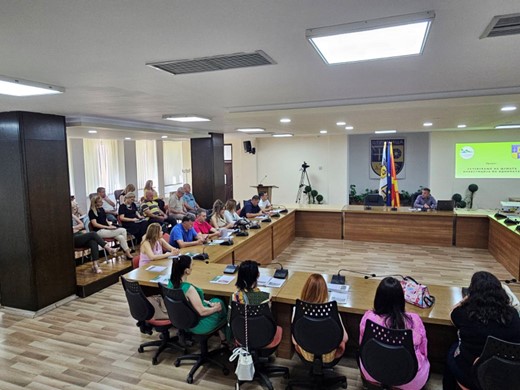
SCALE-UP's spanish project partner CTA organizes an international meeting in Linares on opportunities of the olive bioeconomy
The SCALE-UP project, a European Union-funded project dedicated to fostering the bioeconomy across Europe, successfully convened a dynamic regional platform meeting in Linares, Andalusia, on 6 June 2024. The event, themed "Bioeconomy in the olive sector as a lever for economic and social transformation," brought together over 80 stakeholders, including the Mayoress of Linares, Auxi del Olmo, underscoring the strong regional support for olive bioeconomy innovation.
Organized by project partners CTA (Technological Corporation of Andalusia) with collaboration with the University of Jaén (UJA), the Andalucía Emprende Foundation, and the Circular Cities and Regions Initiative (CCRI), the meeting showcased the immense potential of the olive sector to drive sustainable economic growth and job creation in Andalusia.
"The bioeconomy is poised to be a driving force of progress in this century," declared Mayoress del Olmo, emphasizing the City Council's commitment to fostering Linares as a hub of bio-based innovation. This sentiment was echoed by CTA President, Beltrán Pérez, who highlighted the significant role of Andalusia's abundant olive groves in unlocking the region's bioeconomy potential.
A key focus of the event was connecting research and innovation with practical applications. Participants gained insights into groundbreaking R&D&I projects and funding opportunities designed to accelerate the development and commercialization of olive-based bio-products. Presentations from organizations such as the Andaltec Foundation R&D&I Technological Center, Bioliza, Ecogestiona, Smallops, and Naturphenolive provided concrete examples of the olive bioeconomy in action.
The SCALE-UP project is playing a pivotal role in establishing a thriving bioeconomy ecosystem in Andalusia and beyond. By connecting stakeholders, facilitating knowledge exchange, and supporting innovative projects, the project is helping to unlock the full potential of the olive sector and pave the way for a more sustainable future.
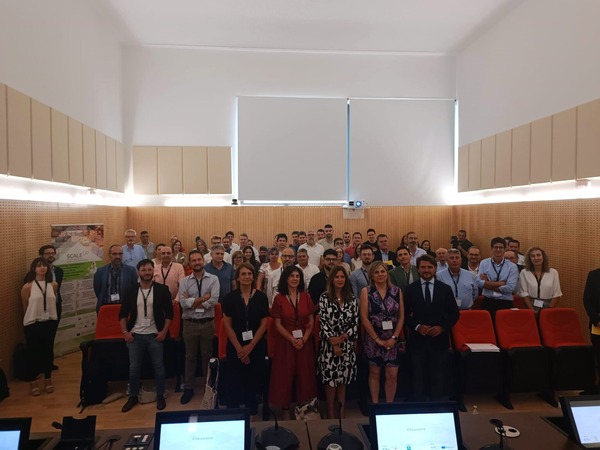
SCALE-UP held Regional platform meeting in Normandy for a demonstration of chopped straw
As part of the European project SCALE-UP, AC3A, the Normandy Regional Chamber of Agriculture, with the support of its partners, organised a day dedicated to straw-based materials for the building industry.
On Monday 15 April at the Boucles de la Seine Regional Nature Park in Normandy, 40 stakeholders in the building industry came together to discover an innovation in construction. After a presentation of the SCALE-UP project and the results of the study on straw availability in the region, the attendees had the opportunity to see a demonstration of insufflation of chopped straw for insulation purposes. The event was an opportunity to bring together all the stakeholders in the sector, from farmers and social landlords to architects and craftsmen.
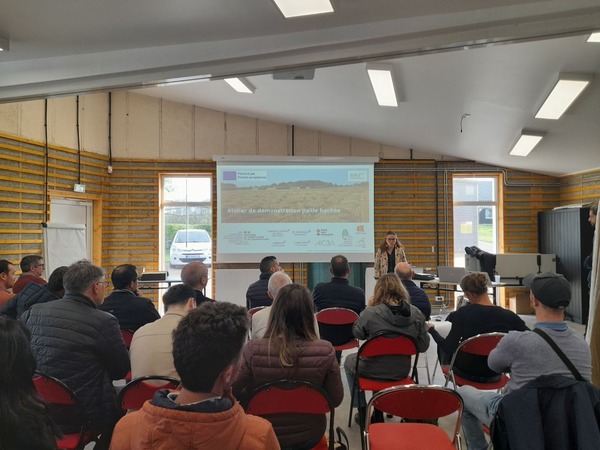
Straw reduces the environmental footprint of construction and provides excellent thermal and acoustic insulation. But in addition to these advantages, chopped straw is quicker and easier to use, and has recently been covered by national regulations.
And only 5% of the straw produced in Normandy would be needed for all new buildings: a first step towards the widespread use of bio-based insulation.
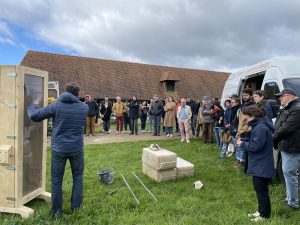
SCALE-UP Project Successfully Concludes International Study Tour on Bioeconomy Along the Danube
The SCALE-UP project has successfully concluded its International Study Tour focusing on the bioeconomy in Austria and Germany. The tour, which took place from April 16-18, 2024, showcased innovative projects and initiatives in the field of sustainable biomass utilization.
The study tour commenced in Linz, Austria, where participants visited the Biomass power plant of the city of Linz and the Wood K plus research institution, which focuses on wood and wood-related renewable resources. The tour also included a city tour of Linz and a presentation of the business model of HochBROTzentig, a bakery that started a cooperation with a distillery to produce high quality spirits from leftover bread.

On the second day, the tour proceeded by bus to visit the Oilmill Raab, an organic farm and oil mill that produces high-quality oils and has participated in a project using oil press cake for protein extraction. The group then visited the Eggenberg Brewery to learn about the use of spent grains as feed and other applications. The day concluded with a visit to Lenzing AG, the world-leading cellulose fibre producer.
The final day of the study tour took place in Straubing, Germany, where participants visited Anatol Donkan, a fish leather manufacture that creates crafts and art projects from fish hide. The tour also included a visit to the BioCampus Straubing, a location development and business promotion company that supports start-ups and existing companies involved in the material or energy utilization of biomass.
The International Study Tour successfully showcased the potential of the bioeconomy in the Danube region and fostered collaboration among researchers, industry stakeholders, and policymakers. By sharing knowledge and best practices, the SCALE-UP project has contributed to the development of sustainable and innovative solutions in the bioeconomy sector.
Exploring Europe’s bioeconomy potential: SCALE-UP project releases comprehensive factsheets
The SCALE-UP project has assessed the bioeconomy potential of six European regions, resulting in comprehensive factsheets. The findings from these assessments show that there are significant biomass resources available in the six European regions, offering various possibilities for the production of bio-based solutions and nutrient recycling, within the ecological boundaries.
These factsheets assess the bioeconomy potential within the region, analysing three main factors:
• Biomass availability: Examining agricultural, forestry and industrial residues to identify potential resources for bio-based products and services.
• Ecological boundaries: Assessing the environmental limitations to ensure bioeconomic activities operate within sustainable parameters.
• Nutrient recycling: Evaluating opportunities to recycle nutrients in the value chain, making residues a valuable resource and minimizing environmental impact.
The project recognizes the importance of considering the potential environmental impacts of activities. A sustainability screening approach, focusing on soil, water, and biodiversity, has been implemented to ensure long-term sustainable production.
The assessments provide a roadmap for developing a thriving and sustainable bioeconomy in the region. With this knowledge, stakeholders can make educated decisions that promote the growth of the bioeconomy, while simultaneously protecting the environment. The findings and recommendations offer valuable insights for policymakers, businesses, and individuals interested in building sustainable bioeconomies across Europe.
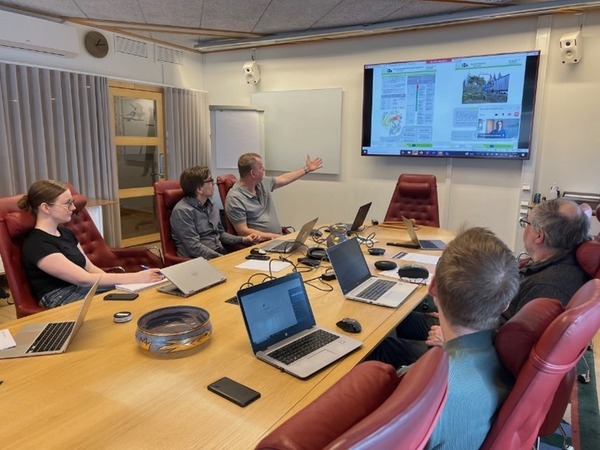
Factsheets presented at regional platform meeting, photo: © BFR.
About SCALE-UP:
The SCALE-UP project aims to develop sustainable bioeconomies in six European regions: Northern Sweden, Mazovia (Poland), the French Atlantic Arc, Upper Austria, Andalusia (Spain), and Strumica (North Macedonia).
Find the regional assessments and factsheets here:
Northern Sweden, Mazovia (Poland), French Atlantic Arc, Upper Austria, Strumica (North Macedonia), Andalusia (Spain)!
Or read the full report here.
SCALE-UP Project Holds Third Strumica Regional Platform Meeting Virtually, Focusing on Sustainability
The third regional platform meeting for the SCALE-UP project in Strumica took place on February 29, 2024, as a virtual Zoom event. Representatives from the Municipality of Strumica, NGO Planetum, and SDEWES-Skopje participated in the online gathering.
Key highlights of the meeting included presentations on recent SCALE-UP documents and reports, covering topics such as past trainings on digitization in the bioeconomy, regional biomass availability, ecological boundaries, information packages, and the Social Innovation Handbook.
A significant part of the discussion focused on generating recommendations for water, soil, and biodiversity tailored to the Sustainability Screening in the Strumica region. Stakeholder feedback emphasized advancements in water-related activities, ongoing efforts in sustainable agriculture, and measures to preserve biodiversity.
Future initiatives were outlined, including active participation in training sessions on nutrient recycling in the circular bioeconomy, organizing a student competition, and Тask Force group meetings for Innovation Program and MAF+ platform. The promotion of international study visits for 2024 was also highlighted, offering collaboration opportunities among stakeholders and experts from various countries.

SCALE-UP Project Study Tour Explores Bioeconomy Potential in Strumica, North Macedonia, and Unveils Collaborative Initiatives with Open City Laboratory
The recently concluded SCALE-UP project study tour in Strumica, North Macedonia, has shed light on the region's immense bioeconomy potential, with a particular focus on composting. The two-day visit brought together stakeholders, experts, and innovators from Northern Sweden, Poland, Upper Austria, Spain, Germany and the Netherlands to exchange ideas and explore sustainable bioeconomy development.

Objective and Scope: Unlocking Bioeconomy Potential in Strumica
Strumica, situated in the South-eastern part of North Macedonia, showcased itself as a national leader in agriculture production. The study tour delved into the region's efforts to accelerate sustainable bioeconomy development, with a specific emphasis on composting within the value chain. The exploration covered diverse biomass streams from primary producers, processing industries, and residential and commercial waste sectors.
The tour aimed to present local and national composting practices, fostering an exchange of ideas among stakeholders. Despite not being as advanced as some developed EU counterparts, the tour identified noteworthy practices beneficial to agricultural farmers, entrepreneurs, and innovators.

Collaborative Initiatives: Open City Laboratory for Biotransformation
In the framework of the SCALE-UP project, the study tour welcomed external stakeholders and experts for a comprehensive exploration. The hosts, Igor Izotov from UNDP MK, Acceleration Labs, and Prof. Jana Klopchevska, a professor from the Faculty of Technology and Metallurgy in Skopje, guided participants through various aspects of bioeconomy development.
During the study tour, participants had the opportunity to visit the upcoming "Open City Laboratory" for biotransformation in Skopje. In collaboration with UNDP MK, UNICEF MK, and the City of Skopje, this innovative facility, scheduled to commence operations in March 2023, aims to address the challenge of biowaste management in North Macedonia.
Biowaste constitutes a substantial 45.6% of the total waste produced in the country. The Biotransformation Lab will serve as a hub for innovators, entrepreneurs, students, and teachers, providing essential equipment and resources for sustainable biowaste management solutions. The lab's activities include experimentation, learning, and idea testing, fostering social innovation and the development of new methods for managing biowaste.

Activities and Innovations: Transforming Waste into Products
The Open City Laboratory has already produced over 40 biowaste prototypes and generated numerous proposals for industrial use. Innovations range from cosmetics with antimicrobial effects from tobacco waste to bioplastics from potato, banana, and orange waste. The laboratory also hosted events like the Bio Hack My World 2023 Challenge and the Biotechnology in My World Experiential Learning Program.
This collaborative effort represents a significant milestone in North Macedonia's commitment to tackling biowaste management and promoting sustainable practices. The "Open City Laboratory" stands as a beacon of innovation and a catalyst for change in addressing this pressing environmental issue.
For more information, please visit the following links:
1. UNDP Blog - Ahead of the Curve
2. Inspiring Solutions for a Greener World
3. Video Highlights
4. Innovative Biohacking Approach to Biowaste
5. Otvorena gradska laboratorija Facebook Page
6. Otvorena gradska laboratorija Instagram
For further information or media inquiries, please contact:
Emilija Mihajloska
emilija.mihajloska@sdewes.org
SDEWES-SKOPJE
Discovering Macedonia's Green Energy Marvel: SCALE-UP Study Tour Unveils Biogas Plant Innovation
In a recent two-day study tour organized under the SCALE-UP project on 16 and 17 October 2023, a group of stakeholders from Northern Sweden, Poland, Upper Austria, Spain, Germany and the Netherlands delved into the heart of Macedonia's bioeconomy and discovered a groundbreaking biogas plant near Saramzalino. The tour, led by project manager Mr. Arti Qormemeti and power plant manager Mr. Sashko Milovanov, showcased the plant's innovative approach to eco-friendly electricity generation and its role in fostering collaboration with local farmers.
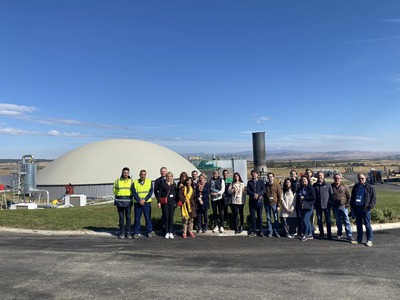
Macedonian Recipe for Biogas Electricity: A Sustainable Energy Revolution
The study tour was strategically designed to provide a holistic understanding of Macedonia's bioeconomy, and the visit to the biogas plant played a pivotal role in this exploration. Participants had the unique opportunity to witness firsthand the collaborative efforts between the plant and local farmers, emphasizing the symbiotic relationship between sustainable energy production and local agricultural practices.
Arti Qormemeti, the project manager, and Mr. Sashko Milovanov, the power plant manager, served as knowledgeable guides during the tour, providing valuable insights into the plant's operations and its collaborative initiatives with local stakeholders. Their expertise illuminated the intricate balance between technology, agriculture, and community engagement that drives the success of the biogas plant.
Journey Unveiled: From Inception to Innovation
The study tour meticulously explored the journey of the biogas plant, from its inception in 2018 to the commencement of the trial period in 2022. With a committed lifecycle of 50 years, this venture represents a steadfast commitment to sustainable energy practices. A focal point of the tour was a detailed exploration of the biogas plant's unique 4-stage anaerobic process, guided by four symbiotic bacteria initially sourced from cow manure. Through on-site demonstrations and discussions, participants gained a profound understanding of the plant's innovative approach to electricity generation.
An exclusive visit to the plant's laboratory showcased the meticulous processes involved in maintaining the health of the crucial bacteria. Daily testing, automatic feeders, and a commitment to continuous improvement were highlighted as essential components of the plant's success.
Sustainable Solutions and Collaborative Commitments
Processing 80 tons of manure from 30,000 pigs and 300 cows, the biogas plant not only generates electricity but also sets an example for repurposing organic waste, reducing air pollution, and greenhouse gas emissions.
Beyond the technical aspects, the study tour emphasized the biogas plant's commitment to sustainable practices and local collaboration. Participants learned about the plant's role in reducing air pollution and greenhouse gas emissions by repurposing organic waste, as well as the collaborative efforts with local farmers to ensure a mutually beneficial relationship.
A Beacon of Sustainability
The study tour concluded with a reflection on the biogas plant's significance as a beacon of sustainability in Macedonia. Participants left with a deeper understanding of how green energy solutions can be integrated into the broader context of a region's bioeconomy, showcasing the potential for replicable and scalable initiatives.
For further information or media inquiries, please contact:
Emilija Mihajloska
emilija.mihajloska@sdewes.org
SDEWES-SKOPJE
SCALE-UP Project Study Tour Unveils Potential in Strumica, North Macedonia
The SCALE-UP project's recent study tour in Strumica, North Macedonia, has proven to be a pivotal exploration of the region's bioeconomy potential, particularly in the domain of composting.
Objective and Scope
Strumica, positioned in the South-eastern part of North Macedonia, showcased itself as a national frontrunner in agriculture production. Recognized for its strategic location and close connections with EU countries Greece and Bulgaria, Strumica stands as a key exporter. The study tour centered around the region's efforts to accelerate sustainable bioeconomy development, specifically in the value chain related to composting. Diverse biomass streams from primary producers, processing industries, and residential and commercial waste sectors were explored to assess availability, quality, and spatial distribution.
The field trip aimed to present the composting aspect on both local and national levels, fostering an exchange of ideas among stakeholders. Although the country and region may not be as advanced as some developed EU counterparts, the study tour identified noteworthy practices that could benefit a range of stakeholders, including agricultural farmers, entrepreneurs, and innovators.
Who Joined the Tour
The study tour, in the framework of the SCALE-UP project, welcomed external stakeholders and experts to participate in the two-day visit. Strumica, focusing on composting within bio-based value chains, presented several good practices. However, the tour's scope extended to encompass various aspects and interests, covering visits to a biogas power plant Saramzalino in Veles, a biotechnology lab “Otvorena gradska labaratorija” in Skopje, and a wood processing company “Artisan Mebel” in Strumica.
Stakeholders, including active members of the Regional Platform, farmers, energy production experts, innovators, and stakeholders in the food-related business sector, were encouraged to attend. Stakeholders had the opportunity to meet with Strumica's Mayor, engage in media interviews, and participate in networking sessions.
The discussions among stakeholders on composting, bioeconomy, and biomass processes have yielded promising outcomes at the networking session. Stakeholders are focusing on innovative composting techniques to improve waste management and soil health. Additionally, they are emphasizing the development of bio-based products in the bioeconomy and more efficient biomass conversion methods, all with the aim of promoting sustainability and reducing environmental impacts.
Beyond Strumica, the tour included visits to Skopje, offering a holistic view of biowaste management, residues collection, and the generation of bio-based products and processes.
Contact:
SCALE-UP Project Coordinator
Email: holger.gerdes@ecologic.eu
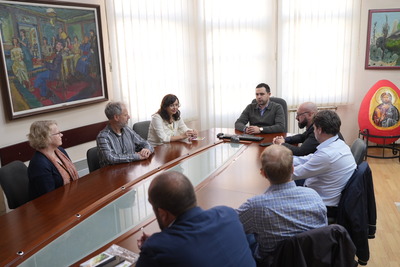
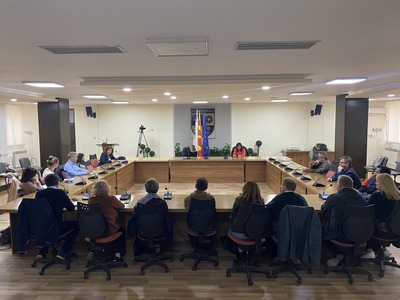
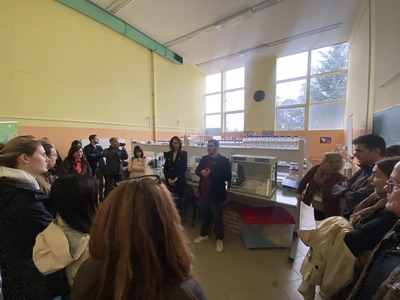

How the Regional Bioeconomy Succeeds - Free Online Training for a Sustainable Economy
Addressing the conscious and sustainable use of natural resources is one of the greatest challenges of our time. The bioeconomy plays a pivotal role in making our economy and society more sustainable and environmentally friendly.
To promote and strengthen knowledge about the bioeconomy, the SCALE-UP project has developed a comprehensive training program. The program offers 21 free online seminars covering seven essential topics related to the bioeconomy. Each topic is covered in three events, providing participants with expert presentations, ample time for discussions, and opportunities to engage with industry colleagues. The training courses are available free of charge and are conducted in English. Additionally, an AI-powered online translator is utilized to provide translations for local languages for the training content.
Kristina Pammer from Business Upper Austria emphasizes the value of these seminars for employees in the food industry, public administration, research institutions, universities, teachers, and NGOs, as they present a unique opportunity to expand their knowledge of the bioeconomy.
To participate in any individual seminar, simply register by sending an email to lebensmittel-cluster@biz-up.at. Please include your name, company, and email address, and you will receive a registration link for the relevant dates in due time.
Training 1: Efficient regional infrastructures and biomass logistics
To be sustainable, bioeconomy needs to apply the principles of the circular economy, by extending the life cycle of the biomass resources and promoting a cascading use of these resources. Bioeconomy also aims at contributing to the neutral carbon emission goals by substituting for fossil-based materials and energy, and by re-localising value chains in the regions. Therefore, sustainable bioeconomy systems strongly depend on efficient regional infrastructures and biomass logistics, which are still lacking to fully achieve bioeconomy potential.
The following barriers are identified:
- lack of interconnection between actors in the value chain to optimise biomass streams, enhance recycling, mutualise infrastructures, transport and energy
- lack of locally available infrastructures to process biomass lack of knowledge on available solutions (example “low-tech” solutions in the context of rural areas), best practices and cooperation models that support efficient biomass management
- lack of awareness of available funding and incentive schemes
This training aims to help the actors: inside the bio-based value chains to overcome the aforementioned obstacles.
Dates:
September 7, 2023
September 26, 2023
October 19, 2023
Training 2: Integrating primary producers into bio-based value chains
In the bioeconomy, primary producers are often left behind in the value chain, despite being the foundation for successful production of bio-based products and processes. This is due to a lack of information and education on relevant topics, as well as a lack of consistent networking. The integration of primary producers is crucial for the success of the bioeconomy, and addressing these issues is necessary to ensure their participation and success in the value chain. With the SCALE-UP training programme, solutions to tackle these issues shall be worked on.
Dates:
November 9, 2023
November 21, 2023
Dezember 7, 2023
Training 3: Digitalisation in the Bioeconomy
Digital solutions hold immense potential for advancing the bioeconomy, particularly in transforming waste streams, residues, and biomass into valuable resources, materials, and energy. However, many entities struggle to keep pace with rapid digital developments and adopt relevant technologies. This training will explore various digital solutions, such as real-time monitoring stations, sensors, Internet of Things (IoT), smart grids, GPS tracking systems, and blockchain, and provide participants with insights on leveraging digitalization investments for bio-based solutions.
Dates:
January 16, 2024
February 6, 2024
February 27, 2024
Training 4: Improved nutrient recycling in the circular bioeconomy
To tackle the challenges of conventional fertilizer production, which heavily relies on fossil fuels and faces looming phosphate shortages, bio-based alternatives for fertilizers offer a promising solution. However, barriers such as policy maker awareness, stakeholder knowledge gaps, and lack of financial support hinder their adoption. This training will equip participants with the necessary information to address these challenges and promote nutrient recycling in the circular bioeconomy.
Dates:
March 12, 2024
April 4, 2024
April 23, 2024
Training 5: Developing and implementing practices of “social innovations” in the context of rural bioeconomies
Achieving a sustainable society necessitates rethinking and innovating economic processes, governance models, consumption patterns, value systems, and lifestyles. Social innovations play a crucial role in effecting profound structural changes towards a sustainable bioeconomy. This training will cover various aspects of social innovation development and implementation to foster sustainable bioeconomy practices.
Dates:
May 14, 2024
June 4, 2024
June 25, 2024
Training 6: Effective and innovative governance of regional bio-based systems
Governance plays a vital role in the successful development and implementation of bio-based systems, offering substantial environmental, economic, and social benefits. This training program will address governance challenges, particularly public support schemes, and empower participants with practical skills to develop effective solutions for regional bio-based systems.
Dates:
September 5, 2024
September 26, 2024
October 17, 2024
Training 7: Strategies to address social, ecological and economic trade-offs in regional bioeconomy development
Regional bioeconomy development must strike a balance between various interests, considering social, ecological, and economic aspects. By identifying challenges and fostering effective collaboration among stakeholders, this training aims to find solutions that prioritize ecosystem management, sustainable biomass use, food security, and environmental sustainability in the bioeconomy context.
Dates:
October 31, 2024
November 21, 2024
December 12, 2024
International Collaboration Project - "SCALE-UP"
The "SCALE-UP" project, funded by the European Union’s Horizon Europe research and innovation programme, encompasses all 21 training sessions. Besides Upper Austria, Andalusia (Spain), French Atlantic Arc (France), Strumica (Northern Macedonia), Mazovia (Poland), Northern Sweden are also part of the focus regions.
Project partners
- Ecologic Institute, Germany (Coordinator)
- Association of Chambers of Agriculture in the Atlantic Arc (AC3A), France
- Technological Corporation of Andalusia (CTA), Spain
- International Centre for Sustainable Development of Energy, Water and Environment Systems (SDEWES), North Macedonia
- UNIMOS Foundation (UNIMOS), Poland
- Business Upper Austria, Austria
- Biomass Technology Group (BTG), Netherlands
- WIP Wirtschaft und Infrastruktur GmbH & Co Planungs-KG (WIP), Germany
- BioFuel Region (BFR), Sweden
Original text: Business Upper Austria
The "SCALE-UP" project has received funding from the European Union’s Horizon Europe research and innovation programme under grant agreement No.101060264.
SCALE-UP Project Presented at Clustering Event Promoting European Bioeconomy Collaboration

On July 5th, the renowned European project SCALE-UP took center stage at the Clustering event titled "Promotion of the Andalusian bioeconomy through European projects." Rafael Castillo, a consultant from the Technological Corporation of Andalusia (CTA), consortium member of SCALE-UP, delivered an insightful presentation on the project during the event. CTA, one of the consortium partners of SCALE-UP, organized this gathering, which brought together 18 initiatives focused on biomass utilization and the sustainable development of the Andalusian region.
During her presentation, Rafael Castillo provided attendees with an in-depth understanding of the SCALE-UP project, emphasizing its core objectives and addressing crucial issues related to fossil resource exploitation, risks associated with globalized supply chains for raw materials, and the challenges faced by rural regions in retaining the younger generation and creating viable job opportunities.
Rafael Castillo also shed light on the three innovative tools proposed by SCALE-UP to facilitate the transformation process. These tools include resource flow analysis, which offers circular bioeconomy solutions; a logistics tool for optimizing resource flows; and a quick impact assessment tool to determine the best possible decisions for sustainable outcomes.
The event, which highlighted the significance of cooperation in driving innovation and promoting the circular economy, featured oral presentations, an exhibition area, and networking opportunities. In addition, a comprehensive "Catalogue of Synergies" was designed to facilitate collaboration among European projects. This document compiles technical information on participating projects and identifies potential avenues for cooperation.
The Clustering event provided a valuable platform for knowledge exchange, fostering collaboration, and driving sustainable development within the Andalusian bioeconomy. The presence of the SCALE-UP project showcased its commitment to advancing the bioeconomy and its dedication to regional prosperity.
SCALE-UP Initiative Selects 12 Promising Bio-based Solutions for Innovation Support Programme
SCALE-UP, a groundbreaking initiative aimed at advancing the bioeconomy and fostering sustainable regional development, has announced the selection of 12 innovative bio-based solutions from six European regions. The chosen solutions will be part of the challenging SCALEUP Innovation Support Programme, which aims to provide advisory support and facilitate the growth of these bio-based solutions.
The overall goal of SCALE-UP is to establish and enhance regional multi-actor partnerships involving private businesses, governments, policymakers, civil society organizations, and researchers. By identifying and scaling-up innovative and sustainable bio-based value chains that capitalize on regional resources, SCALE-UP aims to unlock the full potential of the bioeconomy in each region.
Let's take a closer look at the six regions involved in the SCALE-UP initiative and the selected solutions from each region:
Northern Sweden
Reselo: Suberin extraction from birch bark to produce fossil free rubber This innovative solution involves suberin extraction from birch bark to produce fossil-free rubber, offering a sustainable alternative to rubber derived from fossil raw materials.
Wood Fuel Network: Social innovation to strengthen the value chain Multi-actor partnerships to restart logging residue extraction in northern Sweden. The goal of the social innovation is to mobilize all actors within the whole value chain and to communicate and exchange best practices for cost-effective deliveries of logging residues with high quality.
Mazovia, Poland
Biocircular Apple Farm: An interdisciplinary and biocircular space fostering product and service development in the field of bioeconomy and social innovations (from Stowarzyszenje Jablkowa Farma).
Innovations from Apple Pomace: Exploring the creation of new healthy, functional, and ecological products using apple pomace (Gospodarstwo Sadownicze).
Strumica, Macedonia
Bio-compost Machine: A solution focusing on waste management and converting organic waste into organic fertilizer, reducing waste and pollution (DPTU Interaktivna idnina DOOEL – Kavadarci).
Machine for Fine Grinding Residues: A solution to break down plant residues into small particles, enabling their decomposition in the soil and creating bio-fertilizer (ZPGCV Horti Eko Strumica).
Upper Austria
SUN Project - Extraction of Vegetable Proteins: Velvety Manufaktur GmbH aims to develop high-quality food, pharmaceutical, and natural cosmetic products by extracting vegetable proteins from sunflower oil press cake.
Increase the Value of the Meadow Orchard: Streuobstwerkstatt e.U. seeks to generate maximum added value for farmers who cultivate meadow orchards by developing high-quality food products and creating distribution channels.
French Atlantic Arc
COPANO: Developing a straw insulation panel for energy-efficient building construction and thermal renovation, meeting environmental regulations (from COPANO).
L'Atelier du Biosourcé: Promoting the use of biobased materials in construction and renovation projects through collective action (from Entreprise Duchesne).
Andalusia, Spain
Design and Development of Business Model for Biochar: BIOLIZA aims to commercialize biochar obtained from pyrolysis of olive tree and olive oil industry by-products as a soil improver, water absorbent, and CO2 sink in the olive grove.
Biorefinery COMP0LIVE: Fundación Andaltec I+D+i proposes a biorefinery to condition and treat olive pruning, integrating it as reinforcement in polymer-based composite materials, offering opportunities for bioplastics and nanocomposites.
These 12 solutions have been carefully selected based on their technical, social, and market readiness, feasibility, vision, and their alignment with the principles of the bioeconomy. Each solution represents a unique opportunity to drive sustainable development and create value from regional resources.
In the next months, the SCALE-UP Innovation Support Programme will provide dedicated innovation support services, including market assessments and business model designs, to the selected innovators. The programme emphasizes co-creation, transparency, and open innovation, aiming to empower regional stakeholders and facilitate the successful implementation of bio-based solutions.
SCALE-UP Extends Deadline for Call for Expressions of Interest to Boost Regional Bio-Based Solutions Innovation
The SCALE-UP project is excited to announce that the deadline for its Call for Expressions of Interest has been extended until June 16th. This extension provides aspiring entrepreneurs and innovators with an additional opportunity to accelerate their bio-based solutions journey.
The initiative focuses on empowering entrepreneurs to bring their innovative bio-based products and services to market, while fostering research and development within the value chain. By creating a sustainable and thriving bio-based industry, SCALE-UP aims to drive positive change in the field.
Entrepreneur initiatives with small-scale bio-based products or services are invited to apply. The eligible regions include Northern Sweden, Poland (Mazovia), The Atlantic Arc of France, Upper Austria, North Macedonia (Strumica), and Spain (Andalusia). Interested parties must also commit to the memorandum of understanding (MoU).
Selected applicants will receive comprehensive support in critical areas such as market access, business plan development, and funding. Detailed information regarding the Call for Expressions of Interest and the necessary documents, including the MoU, can be found on the project's website.
Don't miss out on this opportunity to accelerate your bio-based solutions innovation journey. Apply now to SCALE-UP's Call for Expressions of Interest: Northern Sweden, Poland (Mazovia), The Atlantic Arc of France, Upper Austria, North Macedonia (Strumica), and Spain (Andalusia).
SCALE-UP Project Showcased at Expobiomasa Professional Fair
The SCALE-UP project was featured at the recent Expobiomasa professional fair held from May 9th to May 11th, 2023 at Feria de Valladolid (Avda. Valladolid). Organized by the Spanish Biomass Association (AVEBIOM), the fair brought together over 350 exhibitors and attracted an average of 12,000 visitors from more than 30 countries.
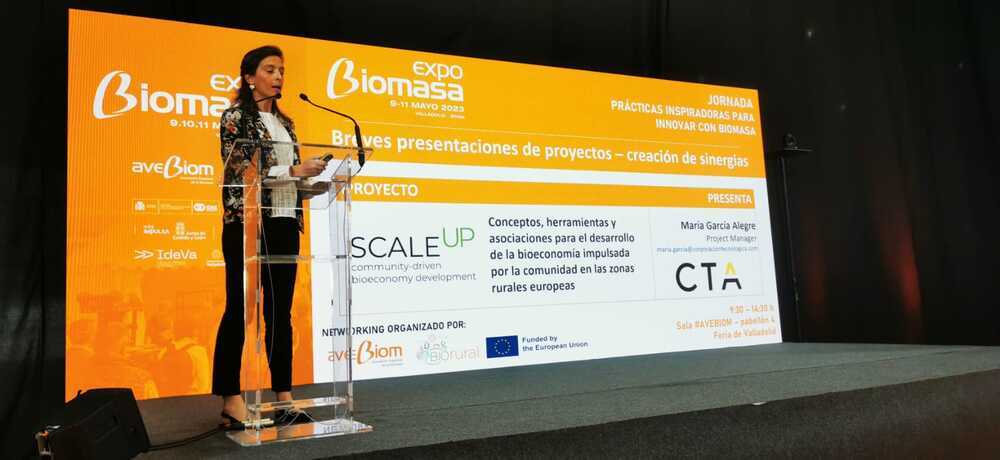
During the event, CTA consultant María García presented three European projects related to biomass, including BIOTRANSFORM, ROBIN, and SCALE-UP. The goal of the presentations was to generate new synergies and introduce new formulas for the use of biomass. The conference had the collaboration of more than 10 national and European innovation projects.
The SCALE-UP project aims to support sustainable rural development and identify innovative business models based on bioeconomy, providing regional actors with the tools to identify and develop these models. The project is focused on creating networks for private businesses, governments, policymakers, civil society organizations, and researchers to build innovative and sustainable bio-based value chains that build on regional resources.
The Expobiomasa professional fair provided an excellent platform to learn more about the innovative projects taking place in the biomass sector. For more information, please visit: https://expobiomasa.com/actividades-paralelas/innovaciones.
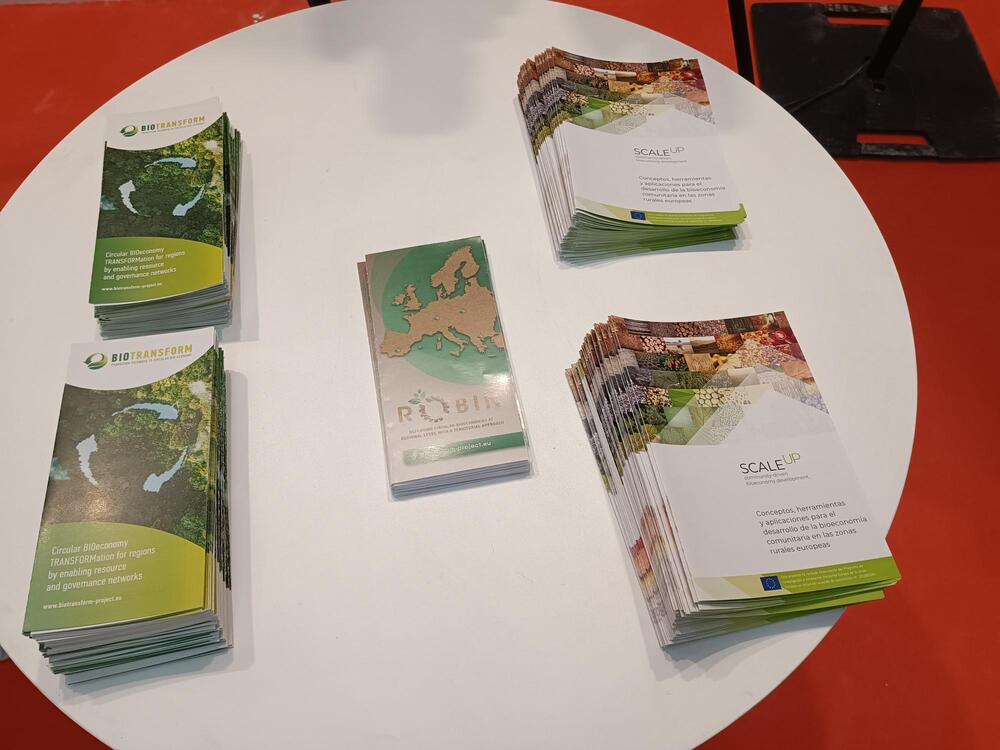
SCALE-UP Launches Call for Expressions of Interest to Boost Regional Bio-Based Solutions Innovation
SCALE-UP project has issued a Call for Expressions of Interest to identify and support the development of regional bio-based solutions. The initiative aims to provide entrepreneurs with the tools and resources needed to bring innovative solutions to market, while fostering research and development within the value chain.
Applications are open to entrepreneur initiatives with small-scale bio-based products or services established or having a branch office in any of the focal regions: Northern Sweden, Poland (Mazovia), The Atlantic Arc of France, Upper Austria, North Macedonia (Strumica), and Spain (Andalusia). Interested parties must also commit to the memorandum of understanding (MoU).
The program aims to support applicants in areas such as market access, business plan development, and funding. Detailed information about the call can be found on the project's website, where interested parties can access the Call for Expressions of Interest and MoU documents.
Don't miss out on this opportunity to accelerate your bio-based solutions innovation journey. Apply now to SCALE-UP's Call for Expressions of Interest: Northern Sweden, Poland (Mazovia), The Atlantic Arc of France, Upper Austria, North Macedonia (Strumica), and Spain (Andalusia).
Second Regional Platform Meeting for Bioeconomy Held in Strumica, North Macedonia
The second meeting (meeting minutes) for the regional platform in Strumica was organized on March 28, 2023, in the Regional Center for Sustainable Development in Strumica and Vasilevo situated in the municipality of Strumica. Thirteen representatives from the Municipality of Strumica, NGO Planetum, NGO Hortieko, the High School "Dimitar Vlahov" and SDEWES-Skopje were participating in this meeting. The event consisted of three parts: a meeting with the mayor’s official representative and the signing of the Memorandum for collaboration in the premises of the municipality of Strumica, info session for SCALE-UP promotion with the local TV media; and a second meeting with the regional platform for bioeconomy in Strumica in the premises of the Regional Center for sustainable development of Strumica and Vasilevo.
The first part of the event was dedicated to the official establishment of collaboration between SDEWES-Skopje and the Municipality of Strumica. Hence, with this, the regional platform for bioeconomy in Strumica is rightfully incorporated as part of the Environment Department within the municipality. On this occasion, SCALE-UP’s aim and activities were presented, and potential synergies with other ongoing projects at the municipal level were communicated. The municipality of Strumica expressed their willingness to strengthen the collaboration, support the SCALE-UP project and enhance the bioeconomy on a regional level. In order to increase the visibility of the SCALE-UP project on a regional level, TV VIS was invited to be part of the promotional session of the project and to conduct an interview for further media dissemination about the regional platform for bioeconomy and the potential for the development of an innovative bio-based business model utilizing the local agricultural residues by creating added value products and services. Additionally, the promotional video was disseminated on national level as part of the news on TV Telma.
Nonetheless, the purpose of the second meeting of the regional platform was to discuss the ongoing activities and, thus, to welcome on board five additional members. Moreover, the results and next steps of the analysis of the needs of the bioeconomy in the Strumica region by introduction of the training of 7 workstreams, their promotion, and a discussion of possible speakers and participants. Additionally, the biomass availability and overview of available documents and studies were exchanged in order to prepare for the mapping of the primary – agricultural producers and secondary – processing industries for a quantitative and qualitative overview of the available bio-based residues. Considering the importance of the development of a plan for the bio-based value chain and business models for composting, the call for identification of regional bio-based solutions by the Program for support of innovative bio-based value chain was introduced and will be additionally promoted for all interested entrepreneurs and stakeholders. The event was concluded by defining the following activities for the regional platform for bioeconomy in the municipality of Strumica and enhancing SCALE-UP promotion.
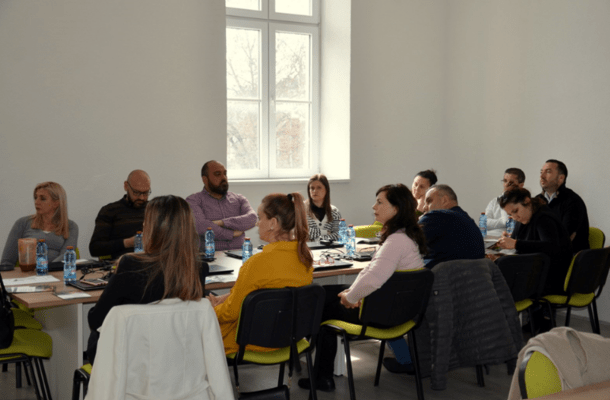

SCALE-UP Project Launches Regional Platforms for Bio-based Innovation
By bringing together key stakeholders in six regions across Europe, the Horizon Europe funded project SCALE-UP aims to promote participatory governance and co-creation of bio-based solutions to support rural bioeconomy development.
The project will create regional platforms linked to existing infrastructures in the six SCALE-UP regions, including Northern Sweden, Mazovia, French Atlantic Arc, Upper Austria, Strumica, and Andalusia. These regional platforms will facilitate participatory governance of regional bio-based systems and engagement with the entire spectrum of bioeconomy stakeholders in each region. SCALE-UP will place an emphasis on co-creation, transparency, and open innovation, and will offer guidance to entrepreneurs on evaluating market conditions within the bioeconomy, crafting business plans, and locating funding sources to support their bio-based solutions.
The kick-off meetings for the regional platforms were recently held in three out of the six regions, namely in Strumica, Upper Austria, and Andalusia. More than 20 stakeholders from municipalities, NGOs, food producing companies, universities, retailers, and business support organizations participated in the kick-off meetings in their respective regions. Participants had the opportunity to gain a deeper understanding of the SCALE-UP project, regional bio-based value chains, and their involvement in this initiative.
"We're excited to launch these regional platforms and support the growth of sustainable bio-based value chains," said Holger Gerdes, the project coordinator for SCALE-UP. "By bringing together key stakeholders in each region, we can ensure that the bioeconomy potential is fully exploited, and that innovation is supported in a way that is sustainable and impactful."
Upcoming kick-off meetings will be organized soon in France, Northern Sweden, and Mazovia. For more information on SCALE-UP, please visit https://www.scaleup-bioeconomy.eu/ or contact the project coordinator Holger Gerdes at holger.gerdes@ecologic.eu.
CTA leads the Andalusian Bioeconomy Platform of the European project SCALE-UP
- To date, the platform brings together eleven entities including agri-food companies, venture capital funds, academic institutions and public administration
- The objective is to facilitate knowledge exchange and capacity building for sustainable rural development of the olive sector in Andalusia
On 9 March, Corporación Tecnológica de Andalucía (CTA) organised the kick-off meeting of the Andalusian Bioeconomy Platform of the European SCALE-UP project. The platform, led by CTA, brought together eleven public and private entities that will analyse the potential of the Andalusian bioeconomy, focusing on the olive value chain. Through regular meetings, its members will work to facilitate knowledge exchange and capacity building for the sustainable rural development of the olive sector in Andalusia.
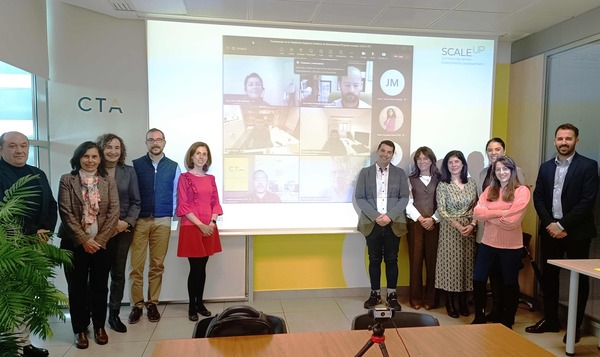
The SCALE-UP project, funded with nearly €3 million by the Horizon Europe programme, will generate new tools and partnerships to boost the development of the bioeconomy in six rural European regions, fostering the creation of new bio-based solutions. It will use six regional platforms located in Northern Sweden, Mazovia (Poland), the Atlantic Arc of France, Upper Austria, Strumica (North Macedonia) and Andalusia (Spain). These platforms will foster the exchange of knowledge on the bioeconomy, the creation of new cooperation networks and the implementation of innovation support services.
Members of the Andalusian Bioeconomy Platform
At the first meeting of the Andalusian Bioeconomy Platform, held in hybrid format at the CTA headquarters, its members were able to learn more about SCALE-UP, exchange presentations with the other entities and discuss their role in this initiative. So far, the entities that make up the platform are:
- The agri-food companies Acesur, Agro Sevilla, la Cooperativa Agrícola San Isidro de Loja, Dcoop and Healthy Food Ibérica.
- The venture capital funds Alter Capital and Axon Partners Group.
- The academic institutions Centro Tecnológico CIDAF, the Instituto Universitario de Investigación de Desarrollo Regional of the University of Granada (UGR) and the Instituto Andaluz de Investigación y Formación Agraria, Pesquera, Alimentaria y de la Producción Ecológica (IFAPA).
- The Consejería de Agricultura, Pesca, Agua y Desarrollo Rural of the Junta de Andalucía, as a public administration.
CTA, as a member of the consortium of this European project, will be in charge of leading the activities of the Andalusian platform. In addition, it will lead the project's business development programme to be implemented in the different regions. With an emphasis on the principles of co-creation, transparency and open innovation, the work plan proposed by CTA will provide advice to entrepreneurs to assess market conditions in the bioeconomy, develop business plans and identify sources of funding for their bio-based solutions.
About SCALE-UP
The European project SCALE-UP (Concepts, tools and applications for community-driven bioeconomy development in European rural areas) has been funded by the European programme Horizon Europe. With a duration of 36 months and an end date of August 2025, the initiative integrates nine European entities from eight countries, such as:
- Ecologic Institute (Germany) - Project coordinator
- Association of Chambers of Agriculture of the Atlantic Arc (France)
- Technological Corporation of Andalusia (Spain)
- International Centre for Sustainable Development of Energy, Water and Environment Systems (Croatia)
- UNIMOS Foundation (Poland)
- Food Cluster - Business Upper Austria (Austria)
- Biomass Technology Group (The Netherlands)
- WIP - Renewable Energies (Germany)
- BioFuel Region (Sweden)
Northern Sweden as a model and inspiration
In cooperation with bioeconomy stakeholders in northern Sweden, BioFuel Region has organized the annual Swedish Bioeconomy Parliament in February 2023. The theme for the event was changes within the EU, nationally, and in northern Sweden and their effects on the bioeconomy. During two days, the forest bioeconomy contribution to regional development was discussed with good examples from northern Sweden, as a model and for inspiration.
140 stakeholders representing national and regional authorities, politicians, enterprises, researchers, start-ups and students participated. These stakeholders also formed the framework of the program. SCALE-UP project partner, BioFuel Region, coordinated the conference and had a lot of opportunities to explain what is being done within the Scale-up project. During the planning of the parliament, relations with existing networks were strengthened and connections with many new stakeholders were established.
This parliament has created goodwill among stakeholders and will be our most important arena to facilitate the establishment of a regional bioeconomy platform, says Magnus Matisons, BioFuel Region.

First regional platform meeting in Strumica, North Macedonia
The kick-off meeting for the regional platform in Strumica was organized on the 7th February, 2023 in the municipal premises. Eight representatives from the Municipality of Strumica, NGO Planetum and SDEWES-Skopje were participating this meeting. The event consisted of two parts: kick-off meeting and official start of the regional platform and participation in a workshop on the topic "From digital transformation to innovation" organized by the Fund for innovation and technology development based on synergetic points related to the development of innovative business ideas in the field of agriculture sector.
Participants were introduced more in details about SCALE-UP project, its activities, regions and conceptual framework. Furthermore, an overview of the regional platform concept was given. By introducing the Terms of Refence, the stakeholders were closely familiarized with the activities as members in the Strumica region. The regional platform will be focused at: Maintaining a constant dialogue between different groups of stakeholders; Harmonization of policies and measures in strategic and planning documents at the regional and national level; Assistance in applying to relevant financial mechanisms; Organization of seminars, educational events or other events related to a specific supply chain; Organization of fairs and other promotional events; Cooperation with the traditional Strumica festival and establishment of a corner for the promotion of the bioeconomy and Identification of good bioeconomy examples and linkage in other regions in North Macedonia.
Additionally, a mapping of existing documents and projects for bio-based value chains (composting) and identification of next activities were conducted, a step which is crucial for further research in the regional bioeconomy development.
The minutes of the meeting is available now.
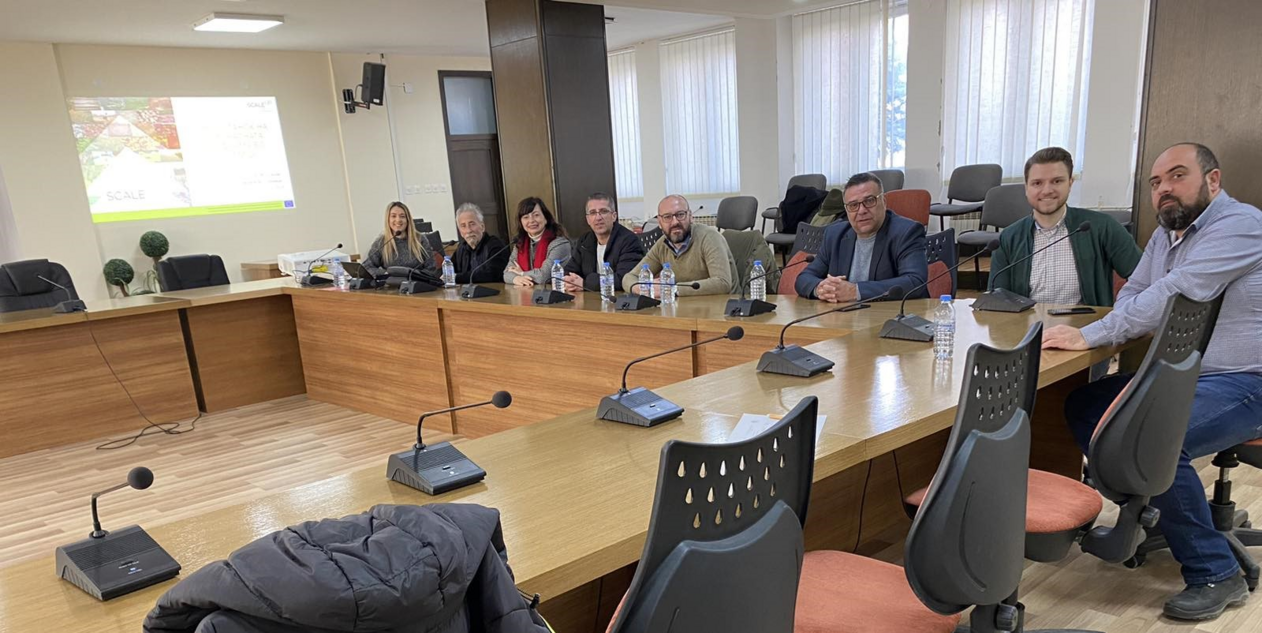
TMG Organized the Austrian Regional Platform Kickoff Meeting
The kick-off meeting for the regional platform in Upper Austria/Linz was organized on the 7th February 2023, in the premises of Business Upper Austria. It was organized as part of the advisory board meeting of the upper austrian food cluster.
Eight external stakeholder were participating in the meeting. They represented food producing companies, universities, retailer and business support organizations. At first, the participants were introduced to the bioeconomy in general and the speaker of the advisory board emphasized the importance of sustainability in the Upper Austrian economy and in particular the enormously important role which circular economy and bioeconomy will play in the future in the enterprises.
The participants got insights into different projects running by the upper austrian food cluster. SCALE-UP in general and as a second step the regional platform was presented. Joining the regional platform will have following benefits:
- Learn new things about bioeconomy and circular economy
- Best practice examples from Upper Austria and beyond will be presented
- New research results are presented
- Attention to so far unused by-products and how they can be used in a more valuable way.
- Possibility to participate in further education events and trainings
- Discuss the future of the country and the bioeconomy
- Network building
Additionally, the tasks and benefits for joining the steering group were introduced to the participants and most of them expressed interest in joining it.
At the end of the meeting, the dates for meetings 2023 were fixed:
- May 03, 2023
- June 13, 2023
- September 12, 2023
- November 28, 2023
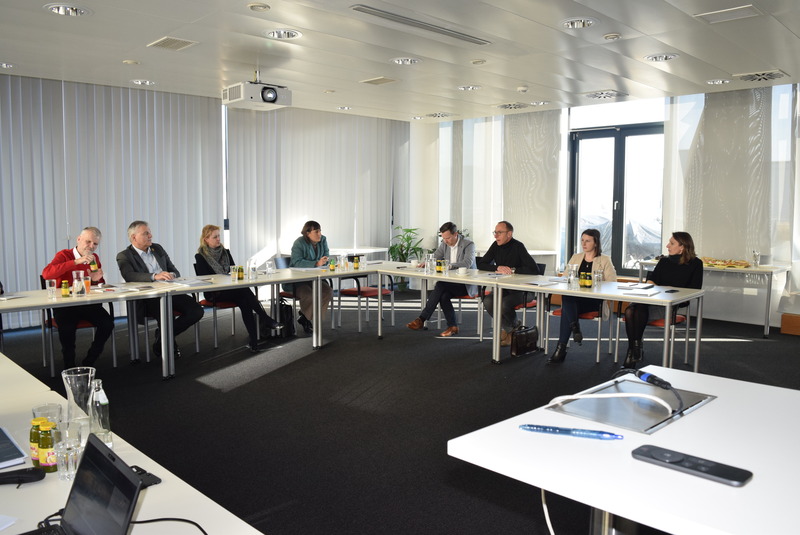
SCALE-UP Community of Practice Meeting
Virtual event, 1 December 2022
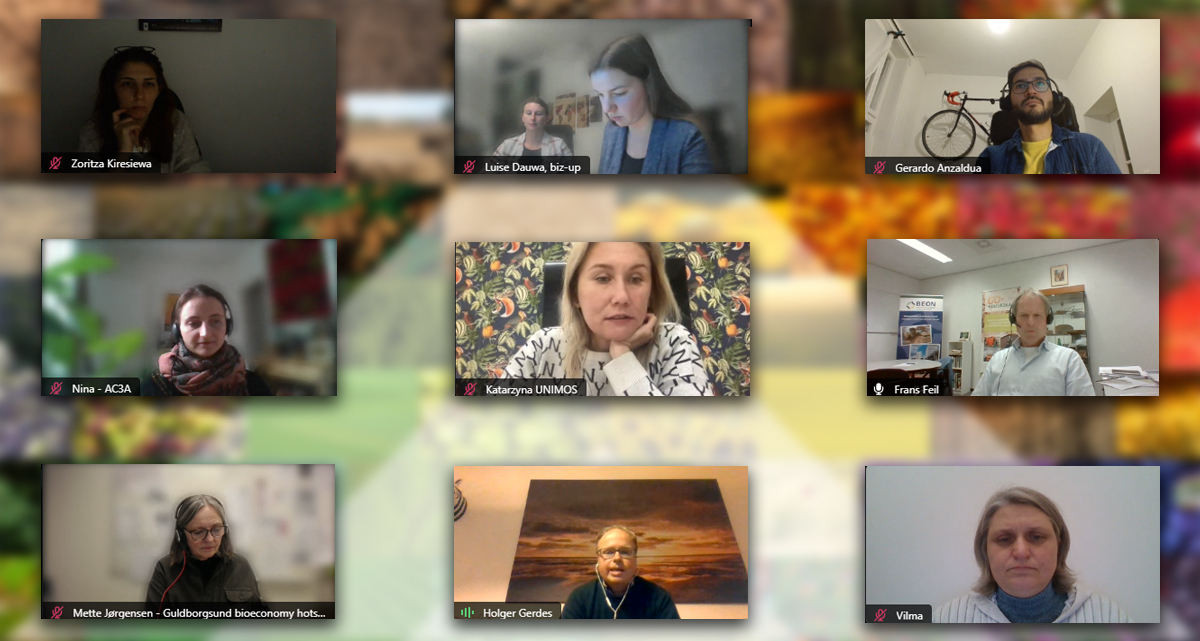
The first joint online meeting with the members of the SCALE-UP Community of Practice (CoP) was held to get to know each other and to present the project’s objectives and planned activities. The agenda and the minutes for the meeting are available now.
Presentations:
- Community of Practice in SCALE-UP
- SCALE-UP Training Programme
- Small Scale Business Model Design & Market Assessment
SCALE-UP Cross-regional Assessment Workshop: presentations and report available
Virtual event, 22 and 23 November 2022
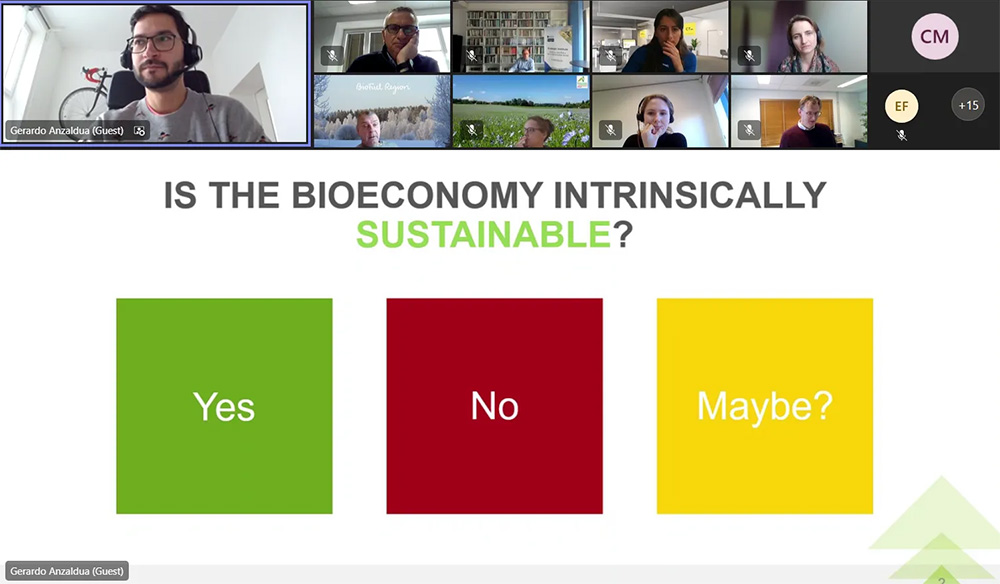
A cross-regional assessment workshop was held online in the framework of the SCALE-UP project. Partners and stakeholders from six SCALE-UP focal regions gave an overview and discussed the current situation and opportunities for the deployment of biobased>solutions in Northern Sweden, Mazovia, French Atlantic Arc, Upper Austria, Strumica and Andalusia.
The presentations and the report of the workshop are available now:
Presentation of Northern Sweden
Presentation of French Atlantic Arc
The report of the cross-regional workshop
SCALE-UP Kick-off-Meeting
Seville, Spain, 14-15 September 2022
The Kick-off-meeting of the SCALE-UP project took place on 14-15 September 2022 in Seville, Spain. Under the coordination of ECO, the consortium planned the work programme for the upcoming three years. The Kick-off-meeting is an internal meeting for the consortium only.
